FORTEVERYNIGHT
Reprieve as bus support extended
04
Extra funding for buses in England

FORTEVERYNIGHT
Reprieve as bus support extended
04
Extra funding for buses in England
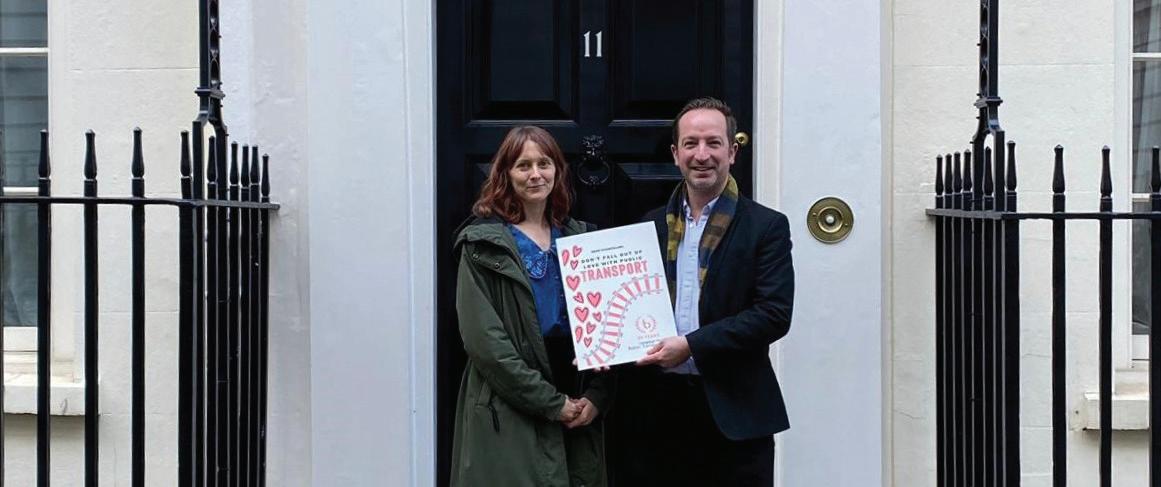
Coalition of 15 charities, business and transport group writes to chancellor to make case for bus, rail and active travel ahead of next month’s budget
A coalition of 15 charities, business and transport groups has written to chancellor Jeremy Hunt to urge him to support buses, trains and active travel in the forthcoming budget on March 15.
To help prevent further cuts to services and ensure there is a public transport network fit for the future, the group is urging Hunt to reprioritise investment away from costly carbon-intensive projects, like roadbuilding, towards low-carbon, clean and healthy transport provision as the best way to achieve economic growth, levelling-up and net zero.
The letter calls on the chancellor to: end the cut to road fuel duty, thereby raising £5bn to invest in the bus and rail network; reform rail fares as a matter of urgency; reform local
transport funding to give local areas greater power; and protect rail capital spending. The letter, which was delivered on February 14, also called for a guarantee of an enhanced funding package for local buses to prevent imminent cuts to services. The government subsequently announced a three-
THE COALITION
month extension of the Bus Recovery Grant and the £2 fare cap for England, but campaigners and bus operators want a longerterm solution (see page 4).
“The impact that inadequate public transport has on the economy, on businesses and on communities, particularly in a cost-of-living crisis, is profound,” said Paul Tuohy, chief executive of Campaign for Better Transport. “It means people losing access to education and jobs, missing hospital appointments, suffering poor health outcomes and being disconnected from family and friends. Investing in public transport and active travel is therefore one of the best ways to achieve economic growth, levelling-up and net zero, and get value for money for taxpayers.”
Welsh minister wanted £1 bus fare cap
10
COMMENT NEWS
Lee Waters wanted to sweeten roads pill
Habits must change - and so must buses
20
Ray Stenning makes rallying cry to sector
Our Westminster insider sees hazards 25
COMMENT
Everything’s going yellow
Jonathan Bray on public sector vision 16

editorial@passengertransport.co.uk
StagecoachWestScotlandthisweek unveileditsfleetof27fullyelectric buses.Thismajorinvestmentof around£15.7msees25VolvoBZL single-deckbuses-thefirstto operateintheUK-addedtothe fleetaswellastwoADL/BYDbuses.
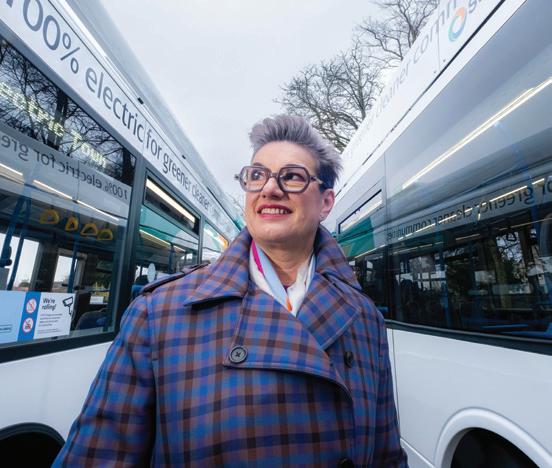
15
The chancellor was urged to “show public transport some love” by a coalition of 15 charities, businesses and transport groups on Valentine’s Day. Three days later the government did just that for buses in England when it extended the emergency funding support and the £2 fare cap at a combined cost of £155m. However, this is love on a rolling contract rather than a lifelong commitment. Bus operators will now wait two and a half months before they are next forced to consider making significant service cuts to balance the books.
It’s encouraging that the statement announcing the extra funding featured a quote from Rishi Sunak. Boris Johnson will be able to claim a positive legacy if he has normalised the idea that prime ministers should talk about buses. “I’m determined to ensure that no matter where you live, you have the same opportunities to get around easily and can feel pride in your local area - which is why protecting our local bus services is so important,” said Sunak. We must hold him to that. Meanwhile, in Wales, the deputy minister for climate change, Lee Waters, really is showing public transport and active travel some love. His radical reorientation of roads policy is perhaps the biggest and bravest leap in favour of sustainable transport since Ken Livingstone introduced the congestion charge in London 20 years ago. It’s a shame he was unable to accompany it with his plans for a £1 bus fare cap in Wales (see page 10) but let’s hope it also becomes a game-changer.
PASSENGER TRANSPORT editorial@passengertransport.co.uk
forename.surname@ passengertransport.co.uk
Telephone: 020 3950 8000
Managing Editor & Publisher
Robert Jack
Deputy Editor Andrew Garnett
Contributing Writer Rhodri Clark

Directors Chris Cheek, Andrew Garnett, Robert Jack
OFFICE CONTACT DETAILS
Passenger Transport Publishing Ltd PO Box 5496, Westbury BA13 9BX, UNITED KINGDOM
Telephone (all enquiries): 020 3950 8000
EDITORIAL editorial@passengertransport.co.uk
ADVERTISING ads@passengertransport.co.uk
SUBSCRIPTIONS subs@passengertransport.co.uk
ACCOUNTS accounts@passengertransport.co.uk Passenger
Transdevhassaidthenumberof peopleusingitsapptotracktheir bus,checkforavailableseatsand buyticketsbeforeboardinghas doubledinjust18months-andfor thefirsttime,over100,000peoplea montharenowusingTransdevGo.
18
It’sbeenatoughfewyearsforBritain’s busoperatorsandissuesoverfunding haveonlymadethingsworse.“It’s easytogrumbleandI’mnormally worsethanmost,butI’veneverfeltso goodaboutthebussectorintheUKandhere’swhy,”writes Alex Warner
33
Theplanningsystemwassimplified in2012andithadadetrimentalaffect onpublictransport.Potentialrevisions toNationalPlanningPolicyFramework mustdeliverchangeorwewillseeyet moreinappropriatedevelopments, writes Nick
RichardsonThe government has announced an extension of the Bus Recovery Grant and £2 fare cap until the summer, but operators call for a long-term deal
FUNDING
The government announced further emergency funding for England’s buses last week just days before operators were expected to announce significant cuts to their networks.
Analysis by the Confederation of Passenger Transport had suggested that more than 1,600 bus routes in England were poised to be cut, leaving the country with fewer than 10,000 registered local bus services for the first time (PT282).
It is understood that eleventh hour negotiations between officials and ministers from the Department for Transport and the Treasury secured a deal that will release £75m to extend the current £2 fare cap on England’s buses outside London until June 30. A further £80m will be used to extend the current Bus Recovery Grant scheme until the same date.
The government said extending the £2 scheme will save passengers money at a time when the country is battling a cost-of-living crisis. It will also encourage more people back on the bus. The current average single bus fare in England is £2.80, leading to significant savings for many passengers.
Prime minister Rishi Sunak said he wanted to make bus travel affordable for all and ensure there was a “modern and efficient network” across England.
“Getting more people onto reliable and affordable buses will strengthen communities and help grow the economy,” he added. “I’m determined to ensure that no
matter where you live, you have the same opportunities to get around easily and can feel pride in your local area - which is why protecting our local bus services is so important.”
DfT officials said the existing £60m funding in the fare cap had already shown signs of growing patronage. Earlier this month an independent survey of 1,000 people from passenger watchdog Transport Focus showed 7% of people said they are using the bus more (PT282).
“During these difficult times, these trends already indicate that the government’s support to cap fares is a welcome intervention,” added the DfT.
England’s bus operators welcomed the move but there was a unanimous call for a longer-term funding arrangement that would remove the uncertainty created by a series of short-term eleventh hour funding deals.
“It is now critical all parties use this three-month extension to move away from short-term funding fixes and instead build a sustainable settlement to unlock the economic, net zero and social wellbeing potential of buses,” said CPT (UK) chief executive Graham Vidler.
Bill Hiron, managing director of Essex-based bus operator Stephensons and chair of the
ALBUM group of non-aligned bus operators, also called for a longer term settlement.
“We cannot continue with a series of short-term funding deals, all announced at the last minute,” he told Passenger Transport. “It makes planning and marketing our services impossible. We don’t want to be on life-support for ever, but until we are confident passenger volumes are back as high as they’re going to get.
“Ideally that means a 12 month settlement, pending the promised review of concessionary fares reimbursement and Bus Service Operators’ Grant from April 2024. As an industry, we need some certainty.”
Martin Dean, managing director of Go-Ahead’s regional bus business, described the £2 fare cap as an “excellent initiative” to promote bus travel.
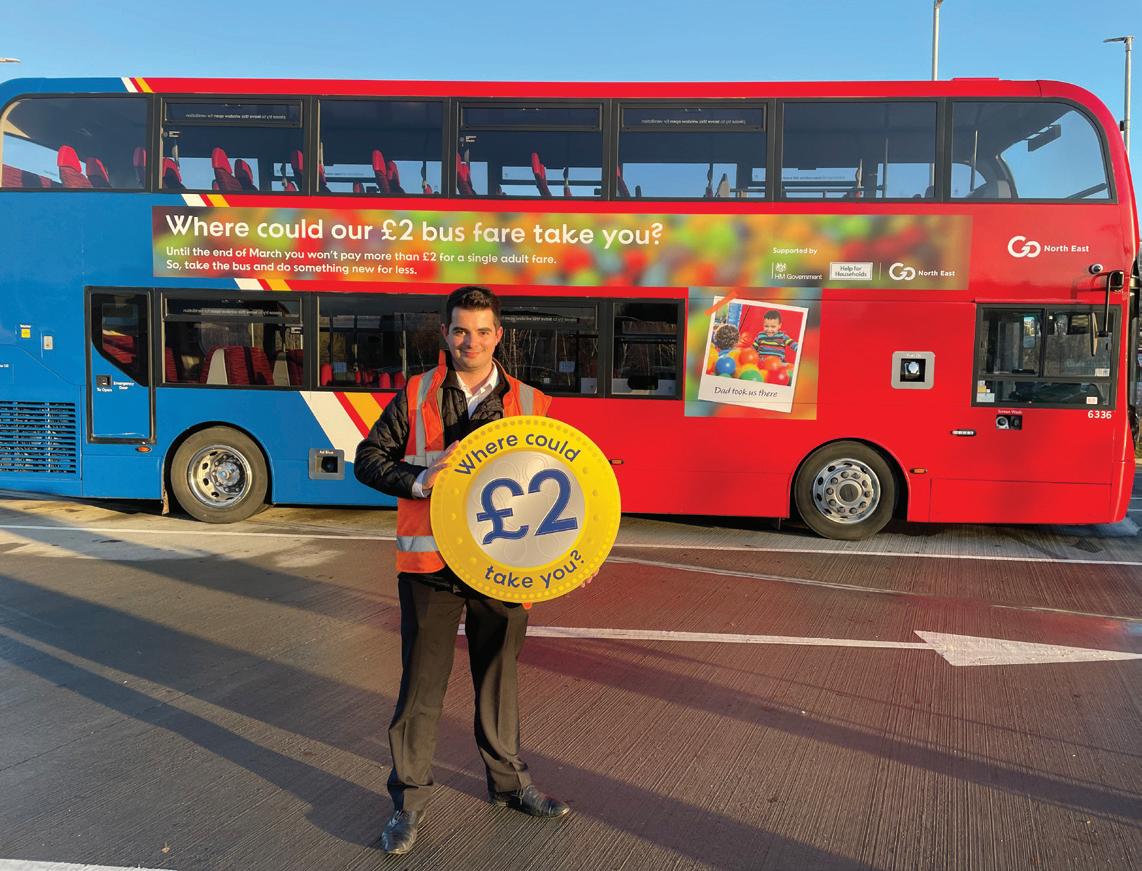
“We’re particularly pleased that the government has extended financial support,” he added. “This valuable funding will safeguard hundreds of routes which are commercially challenging but important for local people. I very much hope a long-term solution can be put in place beyond June to enable us to grow bus networks and plan for the future.”
Campaigners also called on the government to broker a long-term deal with the industry. “Another extension only gets us so far,” said Paul Tuohy from Campaign for Better Transport. “We are urging government to implement long-term funding reform to avoid more uncertainty.”
Transport Focus said that with around half of bus users having no other form of transport, the funding deal was welcome news. Pointing to recent research , chief executive Anthony Smith added: “We also know that bus passengers want simpler, better value for money fares.”
“We cannot continue with a series of short-term funding deals all announced at the last minute” Bill Hiron, ALBUM
PATRONAGE
Transport campaigners have called on the government to step in and offer greater support to local buses after new government statistics revealed the industry is struggling to recapture patronage following the Covid-19 pandemic.
Former transport minister and Campaign for Better Transport director Norman Baker said the figures revealed “a decade of decline” with many communities effectively cut off from the public transport network.
Overall the number of local bus passenger journeys in England saw an increase by 1.3 billion or 79.6% to 2.8 billion in the financial year ending March 2022. This was still far lower than before the onset of the Covid-19 pandemic, where passenger journeys in 2019/20 for England were 4.1 billion.
Bus journeys in England’s city regions or metropolitan areas are
amongst the worst with patronage having fallen from 1.03 billion passengers in 2010/11 to 846 million before the impact of the pandemic in 2019/20. The very latest statistics for the year ending March 2022 reveal there were just 584 million passenger journeys in those areas.
Bus mileage in England saw an increase when compared to the financial year ending 2021 by 93.3 million miles. Bus mileage has been less severely impacted than passenger journeys over the last couple of years, largely due to the emergency funding mechanisms introduced in response to Covid-19 to ensure services kept running.
In the year to March 2022, 1.1 billion bus service miles were run in England, a slight increase when compared with the financial year ending 2021 and 6.1% lower than two years ago.
In England outside London bus mileage saw an increase of 12.7% compared to the financial year ending 2021 but was 8.3 lower than
in the financial year ending 2020.
In London bus mileage also saw a small increase of 2.2% compared to the financial year ending 2021 and returned to similar level as the financial year ending 2020.
London bus mileage has changed very little since the financial year ending 2005, fluctuating between around 285 and 300 million vehicle miles.
Passenger journeys in London accounted for 52% of all passenger journeys made by local buses in England in the financial year ending 2022. There were 1.5 billion passenger journeys made by bus in London in the financial year ending 2022, an increase of 72.4% compared with the financial year ending 2021, which was heavily affected by the impact of Covid-19 movement restrictions. Previously bus patronage in London had robustly increased in every year between 1999 and 2013.
Outside the capital, 1.4 billion passenger journeys were made by local buses in England, an increase of 88.2%. Prior to this bus use
outside London had been on a downward trend since the peak of 2.41 billion passenger journeys in the financial year ending 2009, suggesting a clear link to the Great Recession and subsequent austerity of government spending.
The average number of bus passenger journeys per head in England outside London was 29 in 2021/22, this is higher than the previous year but lower than in 2019/20, where the figure was 42. The peak number of bus passenger journeys per head in England outside London was 55 in 2008/09.
There were falls in bus use across all local authorities between the financial years ending 2020 and 2021, with coronavirus the main factor in this. In comparison, between the financial years ending 2021 and 2022 there were increases across local authorities as restrictions were lifted.
Brighton and Hove is the local authority area with the highest number of passenger journeys per head in England outside London. in 2021/22 this was 110 trips, ahead of Nottingham with 93 trips. Reading was in third place (81 trips); Tyne and Wear fourth (63 trips) and the West Midlands in fifth place (60 trips).
Source:
The statistics also name and shame the English local authorities with the fewest passenger journeys per head for 2021/22. They are Rutland (two trips); Windsor and Maidenhead (five trips); and Somerset, Cheshire East and Herefordshire all with just six trips per head of population.
There were 31,000 buses used by operators on bus services in England in 2021/22, down from 33,000 a year earlier. A total of 92% were enabled for contactless ticketing payments with 57% meeting the latest Euro 6 emission standards.
Buses are heading in the right direction. Page 18
Warrington finalises rejigged ZEBRA plans
The council was successful in securing the largest funding award made from the UK Government’s ZEBRA scheme in 2021. Its £21.5m bid hinged on replacing council-owned operator Warrington’s Own Buses’ fleet of diesel buses with 120 new electric buses.
Independently of the project, as part of the Warrington Town Deal, a brand new bus depot for the operator is currently nearing completion. This has been designed from the ground-up to support electric bus operation.
Transport secretary Mark Harper visited Ballymena-based bus manufacturer Wrightbus last week where he met with senior managers and toured the production line.
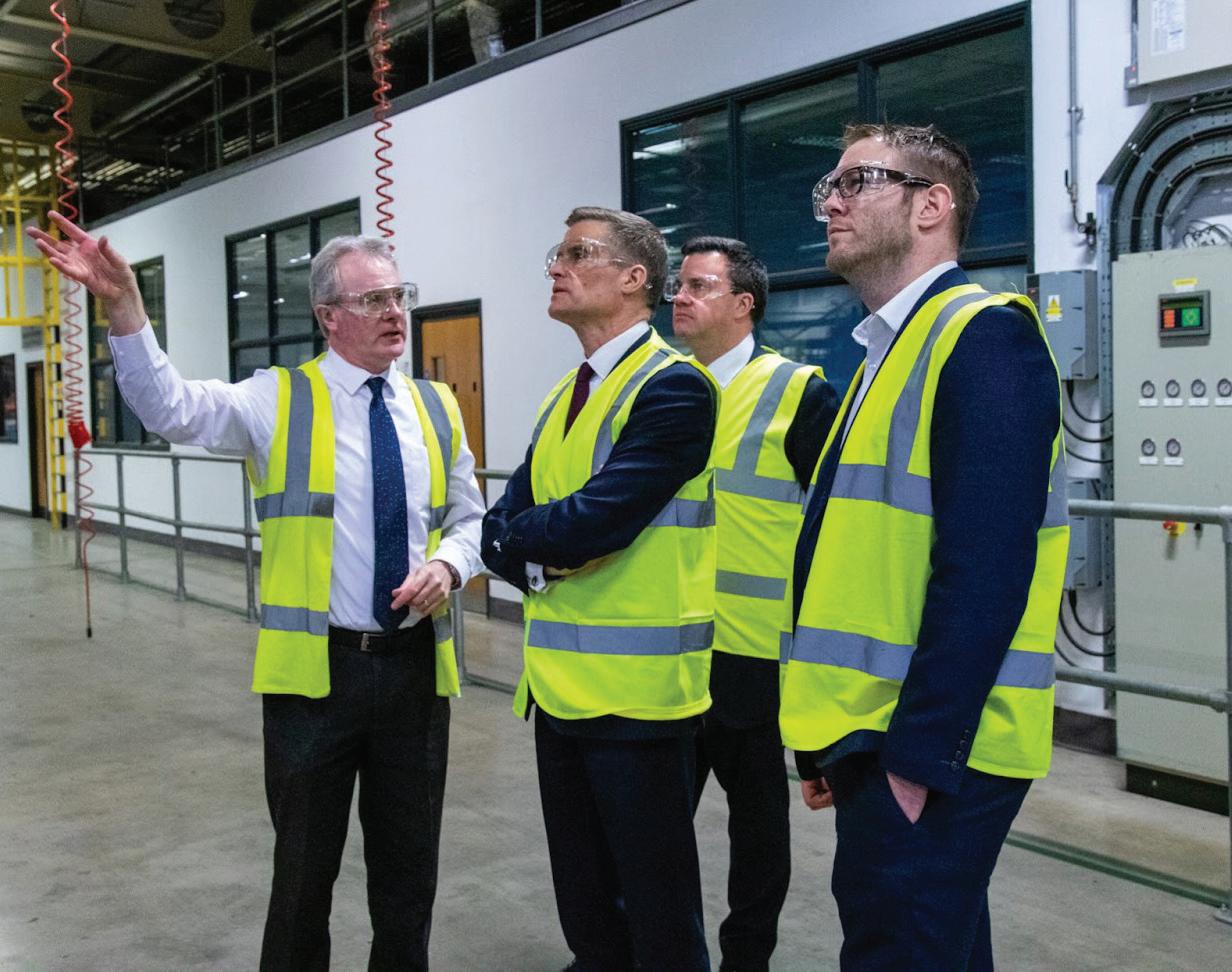
“We were delighted to be able to share with the secretary of state our vision and plans for Wrightbus and what this means for Northern Ireland and the wider United Kingdom,” said Ian Gillott, MD of Wrightbus parts and services.
“The council, working with the government and the bus company, has responded to this with the remodelled scheme,” it added.
“This includes the adjustment of the number of buses to 105 to match the post-Covid requirement, and an increase in the overall budget to deliver the scheme, which is needed due to price increases caused by the current high rate of inflation.”
These revised plans have now been approved by ministers and following ratification by cabinet members, partners in the project will now move forward to deliver the new bus fleet. It is expected that the new fleet of zeroemission buses will be launched next year.
Ben Wakerley, managing director of Warrington’s Own
Buses, said finalising plans for the ZEBRA project was good news for the operator and Warrington as a whole.
He continued: “As well as the clear environmental benefits it will bring, the introduction of our electric fleet will dramatically improve the quality of our services, building on the slashed fares we have already introduced and improving reliability and punctuality.”
Wakerley stressed his company was financially sound and on course to deliver a profit for the current financial year.
He continued: “Around five million bus journeys take place in Warrington each year. The introduction of new, modern, environmentally-friendly buses which are fit for the future, will provide a better experience for customers, bringing more passengers, taking cars off the road and helping to alleviate congestion.”
Move aims to help operators select effective consultants
REGULATION
Some issues that have concerned traffic commissioners in their dealings with consultants include the consultant giving the impression they are the operator; a failure to conduct basic checks on their client’s application; and a failure to keep up-to-date with legislation.
The guidance stresses operators must ensure any consultant they employ has the required knowledge and skills for the role. This includes due diligence to ensure they are up-to-date with relevant changes in legislation, statutory guidance and statutory directions. Operators should also request proof of professional qualifications and seek references from previous clients.
At public inquiries consultants who wish to represent an operator as an “unqualified advocate” must first seek permission to do so well in advance of the hearing date. The guidance also notes that this will always be at the discretion of the presiding traffic commissioner.
Consultants are unable to act as both an advocate and witness in the same proceedings and operators are requested to be mindful of this where a consultant has undertaken work to improve compliance. In such cases it may be more beneficial for them to act as a witness rather than as an advocate, the guidance adds.
The introduction of a £2 fare cap on bus and light rail services in South Yorkshire last autumn has generated a far higher level of demand than expected.
The area’s combined authority chose to launch a £2 fare cap in November 2022 despite failing to win BSIP funding to support such a move. This was also extended to South Yorkshire Supertram single tickets and complemented by the existing notified fare of 80p for young people.
TimTaylor, the combined authority’s director of public transport operations, told members earlier this month that on the basis of costs and trips generated, the scheme had been a success. Initial forecasts were that the scheme for November and December would generate 1.1
million trips with a total cost of £651,000.
“Thus far, following the end of the eight-week scheme in South Yorkshire nearly 1.9 million trips were made across bus and tram at a total cost of £810,000,” he said. “We are still preparing a full evaluation of the scheme, but early indications are that it generated higher than anticipated levels of uptake by passengers.”
Taylor added that a greater proportion of those using the scheme lived in the region’s most deprived areas, indicating that those that are most susceptible to cost-of-living pressures are benefiting most from the scheme.
He also revealed that the increase in single fares had been offset by a reduction in the number of day and weekly tickets sold. He said this indicated that passengers are particularly price sensitive and picking the products (or collection of tickets) which is
South Yorkshire’s mayor seeks to fix ‘broken system’
South Yorkshire mayor
Oliver Coppard has announced he plans to convene a transport summit “to build the vision for the future of the region’s public transport”.
Coppard has made the move as he said that regions like South Yorkshire were “promised a ‘London-style transport network’ by 2030” but with bus
cuts and rail disruption “many places feel further away from that than they ever were”.
He continued: “Fixing South Yorkshire’s public transport system is critical for our region to thrive. If we want to grow our economy, get healthier and create great places to live, a smarter, greener, faster public transport system is vital. That’s why I want
cheapest for them.
However, Taylor said there was no measurable uplift in overall patronage as a result of the scheme, but feedback from some smaller operators indicated they had experienced growth on certain routes, particularly longer routes that potentially served leisure destinations.
He continued: “Nonetheless, the scheme has made (and continues to make) bus and tram travel cheaper for passengers and could be argued as being an effective targeting of subsidy for those that need it.
“Even though people clearly are benefiting from the scheme, they are likely travelling because they have to (for work) and that a more pronounced reduction in fares of itself would not generate significant patronage growth as supported by the lack of growth post-Covid by ENCTS passengers who continued to enjoy free travel on bus and tram.”
Go-Ahead subsidiary East Yorkshire has announced plans for a new depot in Scarborough. The new facility is expected to open in the summer of 2024 to allow the operator’s current two sites at Barry’s Lane and Westwood to be consolidated at a single site on Taylor Way, off Seamer Carr Road. The operator says the new depot will be built to the latest environmental standards and it will also be future-proofed to include facilities that allow a transition to electric buses at some point in the future.
to bring together experts in the field to help us fix our broken public transport system.
“If the government aren’t going to do it, we need to take matters into our own hands and figure out what a ‘London-style transport network’ that works for South Yorkshire looks like. That’s what this summit will help us do.”
The summit will be held on March 1 and it will hear from a series of speakers with national and international experience to “find solutions to fix the broken public transport network”.
The Confederation of Passenger Transport has announced its UK Bus and Coach Conference will be held at the Eastside Rooms in Birmingham on March 30-31. The two-day event will bring together operators, suppliers, key stakeholders and ministers and officials and there will be no cost to CPT members. Keynote speakers and panelists already confirmed include Lord Hendy, Department of Transport directors Stephen Fidler and Jessica Matthews, and shadow buses minister Simon Lightwood. Further details can be found online at bit.ly/3lYPuNh.
The organisers of the Busworld Europe show have confirmed this year’s exhibition will be held on October 7-12 in Brussels, Belgium. Around 400 exhibitors are so far confirmed and the European ZEB Conference, which was last held in Paris in 2021, will run alongside this year’s show. The Busworld Awards will also run in tandem with the exhibition with the organisers also creating a new digital category for exhibitors.
“A more pronounced reduction in fares... would not generate significant patronage growth”
Administrators for Vivarail have announced they have sold a number of assets to train operator Great Western Railway. Vivarail went into administration in December last year after failing to secure new investors. The business had acquired London Underground’s D78 train fleet and planned to ‘upcycle’ them as new trains for regional use. However, administrators said the business had consumed “significant” amounts of cash on product development, maintenance costs and delayed introductions to trains.
GWR has agreed contracts to buy intellectual property, rolling stock and equipment
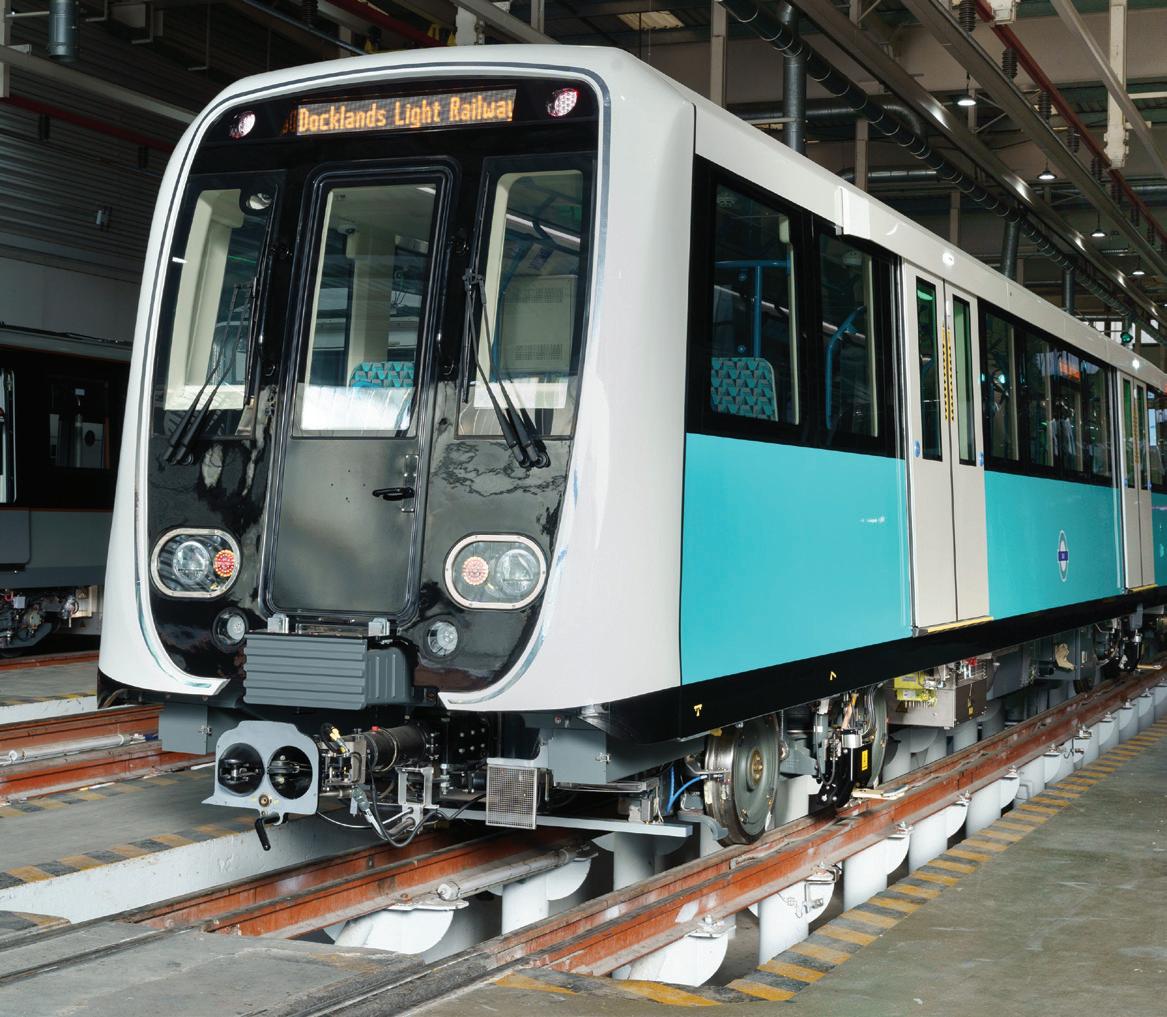
New walk-through trains to enter service in 2024
Transport for London has revealed the first of 54 new trains for the Docklands Light Railway manufactured by CAF. The new fleet, which features a walk-through design and full air conditioning, is expected to enter service in 2024. The trains will replace the existing B90, B92 and B2K fleets, which date from between 1991 and 2002.
“These new state-of-the-art DLR trains will transform journeys,” said London transport commissioner Andy Lord.
relating to the development of high-performance battery and ‘FastCharge’ technology designed to support wider introduction of battery-powered trains on the UK’s rail network.
The deal secures the future of planned trials of the technology in a real-world environment, which GWR was supporting on the Greenford branchline in West London. GWR has taken on nine former Vivarail staff to support the trials and project development.
GWR engineering director Simon Green said: “We’ve been working closely with the Vivarail team on this exciting project for some time, and we are delighted we have been able to step in and make sure its important work can continue.
“There have clearly been some setbacks that mean we will need to review the existing plans and
timescales, but we will continue to work with Network Rail and the Department for Transport to get the project back on track.
“This work is a key part of our commitment to reduce the carbon emissions of our train fleet with a view to removing all diesel-only traction from the network by 2040, in line with the government’s transport decarbonisation plan.”
Of the other Vivarail fleets, London Northwestern Railway has withdrawn their trains on the Marston Vale Line and is now looking at reintroducing Class 150 units at some point in the future.
South Western Railway’s electric Class 484 Vivarail fleet on the Isle of Wight remains in service, while Transport for Wales Rail Services still plans to bring its battery-electric Class 230 Vivarail fleet into service on Wrexham to Bidston services.
Improvements to the Avanti West Coast timetable recovery plan have been welcomed by the Office of Rail and Road.
The rail regulator had expressed concerns that initial improvements to the train operator’s timetables following the introduction of the emergency timetable last summer had stalled. This meant weekend timetables were only being finalised a few days in advance, making it difficult for passengers to plan and book with confidence.
However, the ORR has said that Avanti’s more resilient recovery plan shows a pathway to full and sustained recovery to producing and finalising timetables in line with current industry norms by mid-May. But in a concession to the train operator the regulator noted that planned major engineering works on the West Coast Mainline in March and April had added complexity and risk to Avanti’s plan, and this has impacted on recovery timescales.
The train operator has also published dates for when tickets are to be released for sale on its website. The regulator has said this is an important step to improving information for passengers.
“Now that Avanti has established an improved recovery plan, the onus is on them to deliver,” said Stephanie Tobyn, ORR director of strategy, policy and reform.
“It is positive to see some early improvements to passenger information, in particular the publication of dates when tickets are to be released to passengers.
“This early momentum needs to be sustained and we will closely monitor delivery on a weekly basis”.
The Rail Delivery Group has welcomed the announcement that the TSSA union is to put the latest pay offer in the long-running rail industrial dispute to its members. Meanwhile, the RMT union threatening further industrial action.
The TSSA said the latest offer was the result of “careful negotiations and the commitment of our members in their determination to demonstrate our collective industrial strength”.
“Though the offers represent

progress on a number of fronts we will continue to ballot for further industrial action as the dispute remains live,” the union added.
In response the RDG called on TSSA members to “consider carefully, vote for the deal and end this dispute”. “We listened to the union’s concerns in response to our initial offer and we have addressed them - including increasing our offer on pay,” said a spokesperson. “If they vote yes, TSSA members’ pay will increase by at least 9% over two yearsrising to 13% for the lowest paid.”
However, the RMT union has rejected the latest offer from Network Rail and announced it now plans to stage further industrial action.
A 24-hour strike involving most English operators and Network Rail has been called for March 16, with further walkouts by the staff at operators set to follow on March 18 and 30, and again on April 1. The union has confirmed there will also be an overtime ban at Network Rail, which will include no rest day working and no non-rostered Sunday shifts.
Maintenance staff will take action a week at a time, from March 17 to 23, again from March 31 to April 6 and between April 14 and 20. Operations staff will ban overtime from March 26 to April 1, from April 9 to 15 and from April 23 to 29.
“Rail employers are not being given a fresh mandate by the government to offer our members a new deal,” said RMT secretary general Mick Lynch. “Therefore, our members will now take sustained and targeted industrial action over the next few months.
“The government can settle this dispute easily by unshackling the rail companies. However, its stubborn refusal to do so will now mean more strike action.”
The RDG said the latest round of strikes was “totally unjustified” and accused the union of “reneging” on an earlier agreement to modernise.
Lynch promises a ‘sustained and targetted’ industrial action over the next few months despite TSSA union balloting members on pay offer
“The government can settle this dispute easily by unshackling the rail companies”
Minister wanted to offer a flat fare to counterbalance his radical reshaping of roads policy, but says ‘the Truss budget has blown that out of the water’
Lee Waters, the Welsh Government’s deputy climate change minister, has revealed that he had planned to unveil a flat £1 fare for bus journeys anywhere in Wales as a counterbalance to his radical reshaping of roads policy last week. He said the fiscal legacy of Liz Truss’s short premiership had left his government unable to fund the £1 scheme.
Last week, Waters announced that the government would apply new criteria to future road schemes, with no new roads to be built which would increase capacity or speeds for private cars. This was in line with the recommendations of an independent Roads Review Panel which had scrutinised more than 50 paused schemes, most of which have now been cancelled.
One of the panel’s reasons for rejecting schemes was that the investment would make the private car a more attractive alternative to public transport. This would cause modal shift in the opposite direction to that required for climate change reasons, as set out in the Wales Transport Strategy and Net Zero Wales.
Waters faced a barrage of criticism from politiciansincluding fellow Labour MSs - for halting road schemes. His critics in the Senedd and the media landed punches because he was unable to provide concrete details of new measures to make public transport more attractive as alternatives to the car in areas where roads
had been cancelled. However, the government highlighted that the events of recent months had resulted in its capital budgets for 2024/25 being 8.1% lower in real terms than currently.
Talking to Passenger Transport on the day of the announcement, Waters said: “The Truss budget that blew up has really caused us a number of problems. We had ambitions to introduce a flat £1 bus fare. We had done an awful lot of work with local government and TfW and some bus companies to model how that would work and what it would cost, across Wales.
“We spent over a year on that, behind the scenes. We reached
a figure of around £90m and we had a sporting chance of achieving that before the Truss budget, but the Truss budget has blown that out of the water.
“I would have been much happier announcing the roads review against the backdrop of saying to people, ‘We can make your life easier by giving you cheaper access to buses’, but the UK economic implosion has prevented that from happening.
“It’s also created significant infrastructure cost pressures, as with everybody, which has hit us from TfW.” The cost of the Core Valley Lines programme, currently being delivered by Transport for Wales and Amey, has increased sharply, from about £750m to at least £1bn.
Waters said the impact on the government’s budget “has created some real difficulties for us now when it comes to dealing with the bus crisis”. The short-term picture was very challenging. “We’re not
where we need to be to encourage people to use more public transport because we’re going to be seeing services curtailed, costs going up and a real problem in messaging to people that public transport is something they should be doing over the car.”
During and after the Covid-19 pandemic, bus operators praised the Welsh Government’s relatively long term allocations of emergency funding to support the sector while passenger numbers recovered. A full recovery has still not happened, and operators were alarmed in early February when the government failed to confirm that the Bus Emergency Scheme (BES) would continue after March (PT282).
Operators would have needed to register service reductions with the traffic commissioner by February 3 for the changes to come into effect on April 1, following the 56-day notice period. However, the commissioners have temporarily reduced the window to 28 days to allow for uncertainty over the future of emergency funding in Wales and England.
On February 10, the Welsh Government said it would extend the BES for three months to give the industry short term stability while the government and operators worked together on “planning bus networks which better suit the new travel patterns we have seen since the end of the pandemic”.
Even before the uncertainty over BES began, operators were withdrawing services in response to reduced demand since the pandemic, increased costs or staff shortages. On February 11 the TrawsCymru T19 service between Blaenau Ffestiniog and Llandudno ceased. Adventure Travel has now decided to withdraw its C8 cross-city service between Cardiff Bay and Thornhill on April 4.
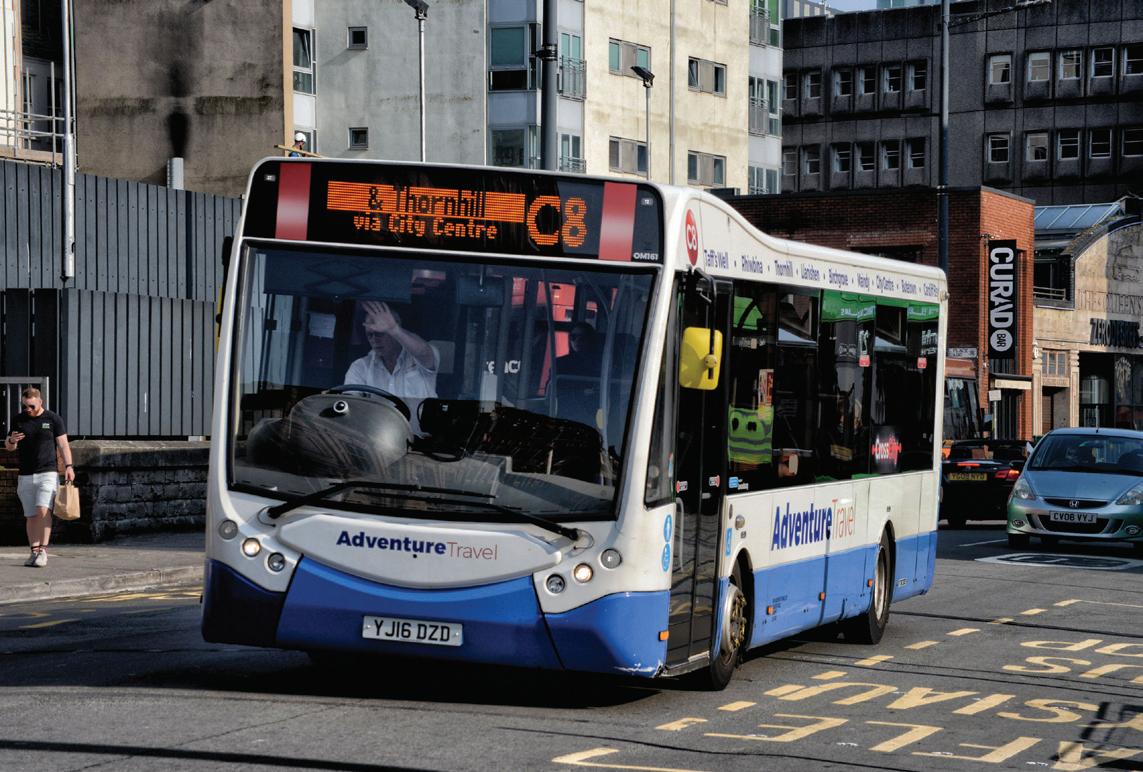
“We had a sporting chance of achieving that before the Truss budget”
Lee WatersWelsh bus passengers are witnessing further service contraction, including the loss of the C8 in Cardiff in April
Transport for Wales has announced First Cymru has successfully tendered to operate the TrawsCymru T1 route between Carmarthen and Aberystwyth. A fleet of Yutong electric buses will be introduced from March 26 on the TrawsCymru T1 route and a new charging hub will open in Carmarthenshire with new facilities for drivers and the buses. Supplied by Pelican, the new buses have been extensively tested for the terrain of Wales and will improve the customer experience offering comfortable seats, air conditioning, reading lights, tables and mobile phone charging
Units will be based at new depot in Taff’s
sockets.
James Price, CEO of Transport for Wales said: “We are looking forward to seeing the new electric buses come into service, improving the customer experience and encouraging more people to leave the car at home
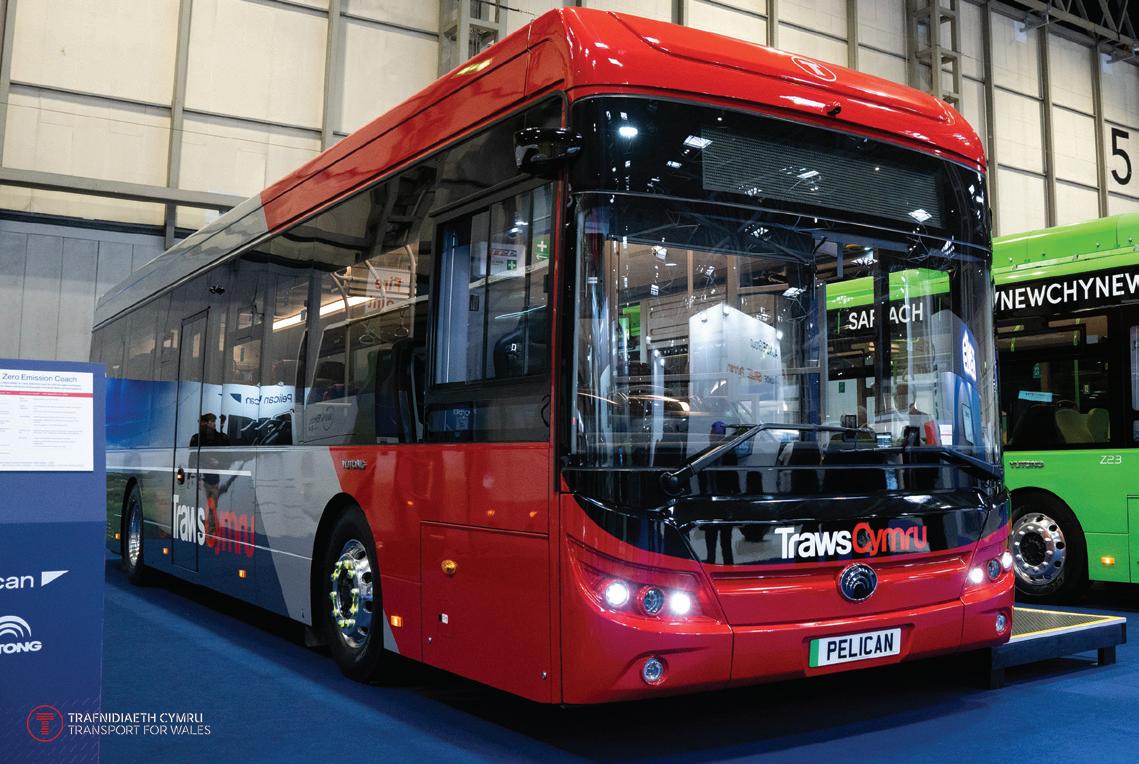
and choose public transport.”
The new fleet will be officially launched by the deputy minister for climate change, Lee Waters at an event in Carmarthen on March 16, ahead of entry into service on March 26.
Support for open access rail services in transport secretary Mark Harper’s George Bradshaw address on rail reform last month has prompted transport group Arriva to call for an open access summit.
“We know through our stewardship of Grand Central and by watching other open access operations, the innovation and customer-focused improvements that can be delivered through such services,” said Arriva UK Trains managing director David Brown. “We are calling for an open access summit bringing together government, the regulator, industry, Network Rail and the Great British Railways Transition Team to collectively work through the barriers and blockers and agree practical steps for unleashing more of these innovative services, including through making best use of unused capacity on the network.”
The Core Valley Lines modernisation is due to pass several milestones in the next two months, including the arrival of the first of 36 Class 398 tram-trains from Stadler.
Transport for Wales and Amey are electrifying the Core Valley Lines (CVL), principally the routes north of Cardiff Queen Street. The first section of overhead wiring is expected to be energised in April, as a prelude to test running and crew training on the Class 398s.
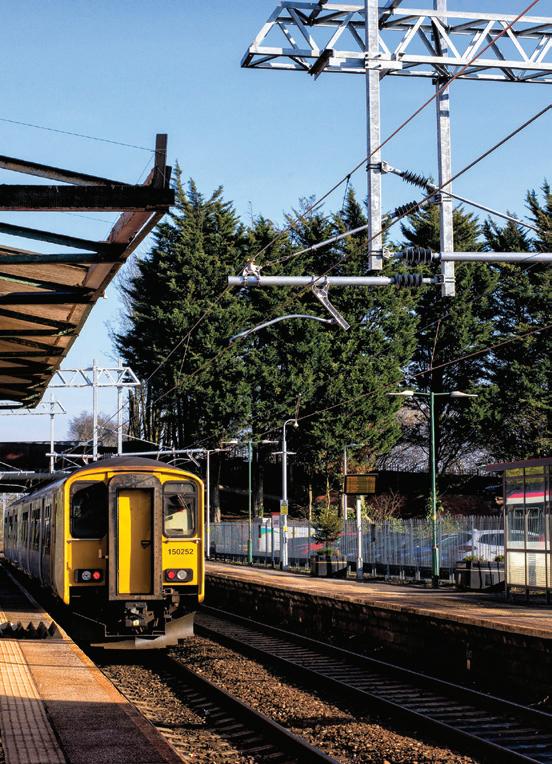
The units will be based at a £100m new depot in Taff’s Well, where construction is well advanced. Track within the depot is due to be connected to the main line next month, via a pair of access tracks which have been installed under a newly built road bridge close to Taff’s Well station.
Initially the tram-trains will replicate current timetables but on completion of the CVL programme in May 2025 they will double the service frequency from Aberdare, Merthyr Tydfil and Treherbert to four per hour. Significant journey time reductions are expected.
The tram-trains are similar to light rail vehicles but meet the safety standards for sharing tracks with heavy rail rolling stock. While the current CVL programme is
limited to segregated routes, the UK Government’s latest Levelling Up Fund round awarded £50m for construction of a short new line at street level from Cardiff Central to Butetown, where tram-trains will
join the branch from Queen Street to Cardiff Bay.
The Welsh Government is matching the funding, and the local authority expects this to be enough to deliver the new line by 2025/26. Any surplus will be put towards a southward extension from Cardiff Bay to Pierhead Street, near the Senedd.
At the other end of the CVL, an extension of the tram-train service is being explored by Rhondda Cynon Taf County Borough Council. The council has been awarded £240,000 by the Cardiff Capital Region Transport Authority for a study of extending the Aberdare line to Hirwaun, including three new stations. A disused railway survives there, having been used for coal trains from Tower Colliery.
SOMERSET’S AWARD WIN
Somerset Passenger Solutions, the FirstGroup subsidiary tasked with transport at the Hinkley Point C nuclear power station project, has been named as Gold Award winner in the Outstanding Supplier Partnership category at the project’s internal awards. It is the third time in the last four years the operator has won the award.
MCGILL’S PARTNERS WITH FLIX
McGill’s Bus Group has confirmed it is to expand its FlixBus operations from seven vehicles to 18 during 2023. The move follows expansion in 2022 which saw the launch of express coach operations in Scotland in addition to cross-border services.
Minister hears about
CONCESSIONARY TRAVEL
Buses minister Richard Holden visited Cornwall earlier this month where he learned about the results of a pilot project between charities Carefree and Barnardo’s, local bus operators and Cornwall Council to offer care leavers free bus travel.
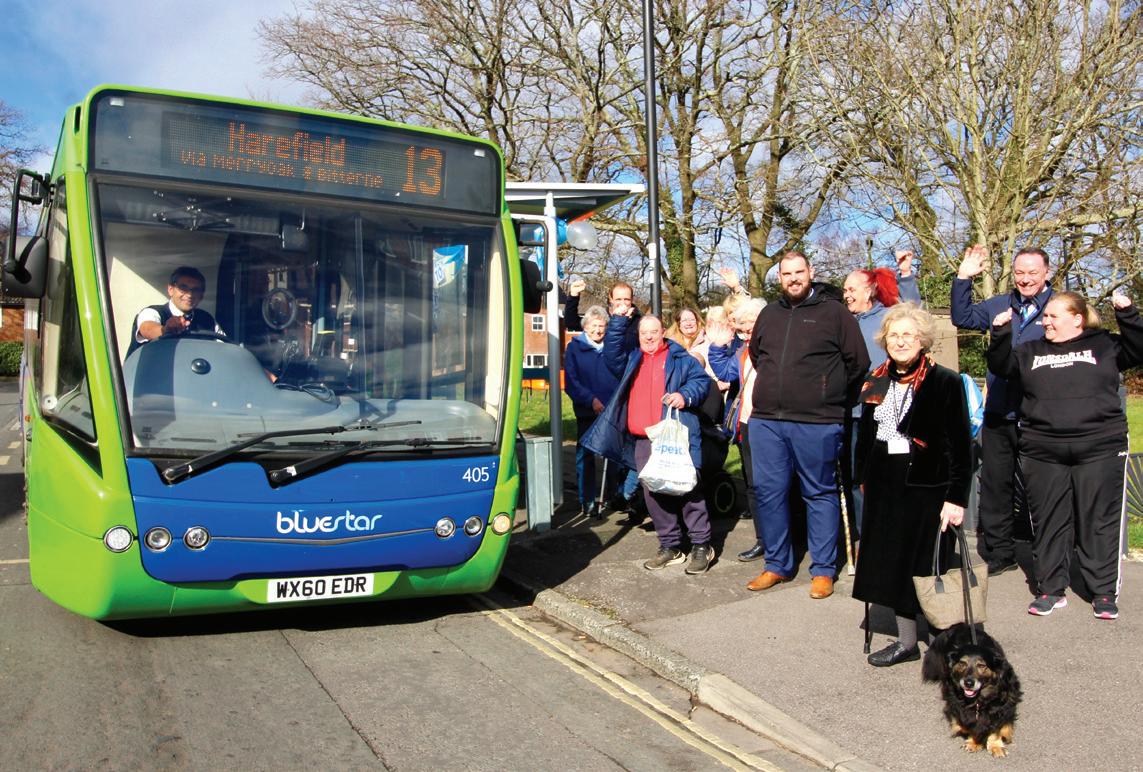
Research by Barnardo’s to gauge the impact of free transport on the lives of care leavers has reported improved mental health, better access to work, training or study and appointments and helping to reduce isolation.
“With the average cost of a weekly bus pass in the UK now more than £18, getting to work or to a job interview can come at a cost that many young people leaving the care system simply cannot afford,” said Barnardo’s chief executive Lynn Parry.
Go-Ahead subsidiary Go South Coast launched its second major expansion in under a year last weekend following FirstGroup’s withdrawal from bus operations in Southampton.
First announced it planned to withdraw from Southampton last November, citing poor patronage recovery, rising costs and a competitive market for its decison to close the business (PT278).
Go South Coast’s Bluestar business has taken on six routes formerly operated as part of First’s City Red network. In a statement the operator said the new network was designed to “ensure local people continue to benefit from comprehensive services across the region”.
Managing director Andrew Wickham said he was delighted to
be celebrating the launch of the new routes.
“With more than 140 new drivers recruited in just two months, we are poised to expand our offering here - and I am in awe of this incredible operation by my team, to ensure our local community in all corners of the city is able to keep moving,” he said. “I’m delighted by the reaction we are already seeing
New buses for Poole-Bournemouth route this summer
Poole-based bus operator Go South Coast has announced it has placed orders for 28 new vehicles that will be introduced at its Morebus-branded operations in Dorset this summer.
Go South Coast managing director Andrew Wickham confirmed the new Alexander Dennis Enviro 400 double deckers will be used to increase
capacity on services which have expanded significantly since the collapse of the former councilowned bus operator Yellow Buses last summer.
A major beneficiary from the investment will be Go South Coast’s flagship M1 route connecting Poole and Bournemouth. It will be operated by double deck vehicles for the
from our new customers who are looking forward to travelling with us on these new routes.”
Meanwhile, local residents in the Harefield area, who have long campaigned for better buses, staged a welcome party for the first Bluestar buses to serve the area. The operator has worked closely with local residents to introduce improved frequencies and a Sunday service.
first time, demonstrating the significant rise in local demand since the demise of Yellow Buses and subsequent consolidation of services.
Meanwhile, the operator has restored a dedicated bus service linking the Ferndown and Uddens industrial estates with Poole. The service had been temporarily halted during the pandemic, but it has now been restored as a result of a partnership with the Ferndown and Uddens Business Improvement District.
The Harefield Bus Campaign group welcomed Bluestar’s new services
Stagecoach West Scotland this week unveiled its fleet of 27 fully electric buses. This major investment of around £15.7m sees 25 Volvo BZL single-deck buses - the first to operate in the UKadded to the fleet. In addition, two Alexander Dennis BYD singledeck buses will be introduced.
Local communities will now benefit from 48 electric buses being used around Ayrshire.
“This is an exciting day for Stagecoach as we launch our new fleet of electric buses, which will serve communities in Ayr, Kilmarnock and Irvine with zero-emission public transport,” said Stagecoach West Scotland managing director Fiona Doherty.
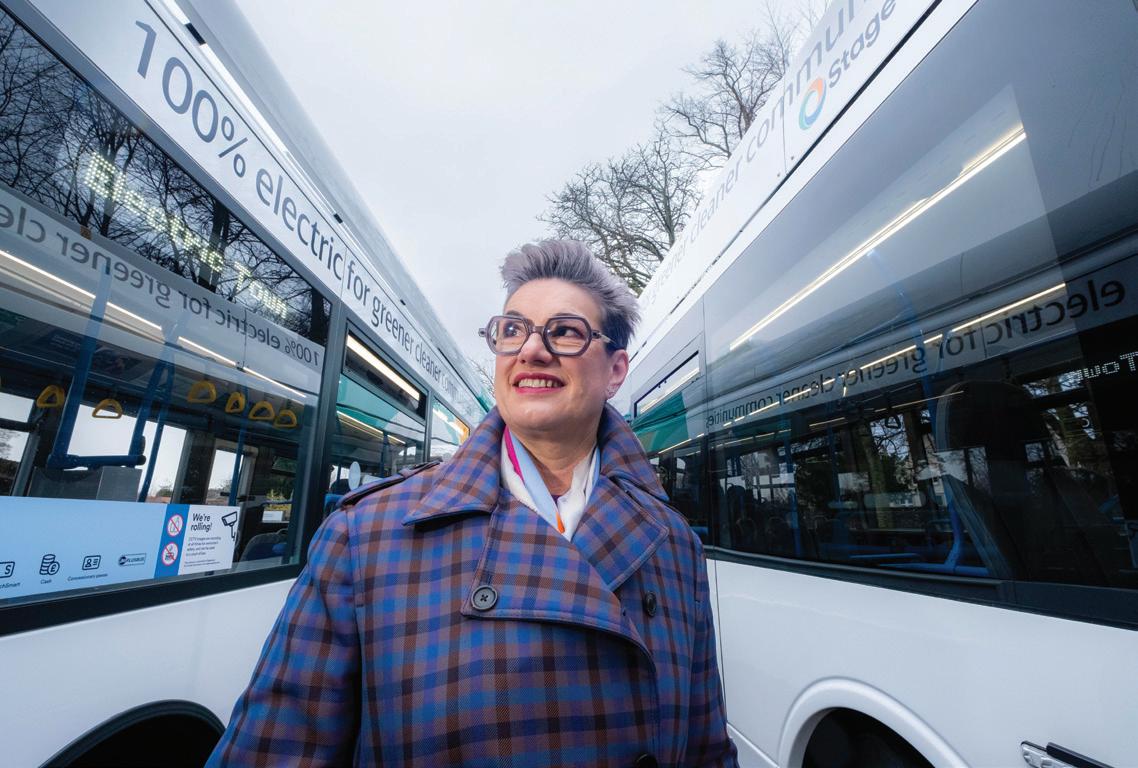
“[This investment] is part of
Net zero targets won’t be met without modal shift
POLICY
A new WPI Economics report, commissioned by the CPT, shows how major benefits could be reaped by levelling the playing field between private motoring and public transport in Scotland.
This follows on from a study last year which showed that attracting drivers to switch some journeys to bus or coach was necessary to meet net zero targets. This would produce significant economic, social and health benefits and be achievable given people’s support for tackling
our strategy to decarbonise our fleet and bring state-of-the-art bus travel to our customers in the urban areas we serve. Bus travel is one of the greenest forms of transport available and we encourage everyone to leave their cars at home and try our new electric buses.”
Stagecoach’s investment in new
electric buses for Ayrshire has been supported by the Scottish Government’s Zero Emission Bus Challenge Fund (ScotZEB).
Transport minister Jenny Gilruth said: “I’m pleased that the Scottish Government has been able to support the ambitions of Stagecoach West Scotland, as part of our Mission Zero for Transport,
by providing £8m through our Scottish Zero Emission Bus Scheme. This is in addition to a further 25 electric buses introduced by Stagecoach for Inverness, supported with £5.8m in funding from government.
The launch is part of Stagecoach’s drive to deliver a net zero UK bus fleet by 2035. The bus operator has invested in installing 21 new charging stations during recent upgrades to its Kilmarnock and Ayr depots.
Domenico Bondi, managing director of Volvo Bus UK & Ireland, said: “Stagecoach West Scotland is a prestigious UK launch customer for the new Volvo BZL Electric. They know precisely what they want from an OEM partner, and they expect a strategic-level supplier to understand their needs and support their long-term goals, with a focus on sustainability, safety, reliability and passenger comfort. It’s a terrific order to win, and we are confident these new vehicles will perform fantastically well across Ayrshire, providing a solid platform for sustainable and efficient public transport.”
climate change.
With a 70-year decline in bus travel, the report makes clear that focusing on one policy alone won’t get the job done. For example, it shows how increasing motoring costs in isolation would hit those who don’t have any other option to use their cars, particularly lower earners. Meanwhile, making bus travel free across Scotland would cost millions without having a significant impact on people’s travel choices.
The report calls for a realistic, fair and politically achievable package of policies to encourage people to switch two car journeys a month to bus or coach. This will ensure a reduction in emissions of 1.1 million tons of CO2, equivalent to the total
transport emissions in Aberdeen.
As well as keeping Scotland on the path to net zero, moving more people onto bus and coach has the potential to unlock huge benefits:
£3.4bn of socioeconomic benefits from changes in travel patterns - equivalent to the total GDP of Dundee in 2019.
£800k in air quality benefits from reduced congestion.
3,000 new jobs and £180m additional GDP through better connectivity to job and services.
Paul White, director at CPT Scotland, which commissioned the report, said: “This is why decisionmakers in Scotland should get on board with bus policy packages because they are fair and achievable
measures to slash carbon, generate new tax revenue, create more jobs and make people healthier.”
To go the full distance of meeting decarbonisation targets, bus packages across Scotland must cover three key policy areas: Investment in bus services and infrastructure to increase attractiveness of the bus network Subsidising bus fares
Charging motorists to drive in congested urban areas
An example comprehensive policy ticket would be to combine £118m per year investment in bus services with a £2 fare cap and a congestion charge in urban areas. This could get Scotland three quarters of the way to its net zero goal.
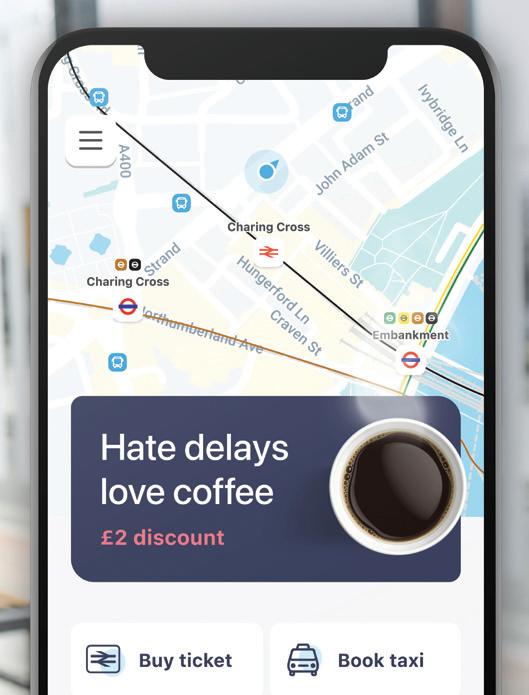
Bus operator Transdev says the number of people using its app to track their bus, check for available seats and buy tickets before boarding has doubled in just 18 months - and for the first time, over 100,000 people a month are now using Transdev Go.

Transdev’s own data shows that across its whole network, stretching from Preston and Manchester in the west to Scarborough and Whitby in the east, one in five of its customers are using tickets bought on the app - rising to two out of five in some locations, making it the most popular way to buy a bus ticket.
Numbers using the app to buy before they board are expected to rise further as the current government-backed £2 fare for any single journey is available to buy instantly on Transdev Go. The cut-price tickets are being promoted by the operator under its own ‘Price Drop’ campaign.
Transdev commercial manager
Matt Burley said: “We’re delighted that so many of our customers are discovering how easy it is to use our app to plan a journey and buy a ticket before boarding their bus.
“Since we began offering our £2 Price Drop ticket on the app - the first time a single fare has been available to buy this way - almost a third of all single tickets are now bought through Transdev Go.
“Our customers clearly enjoy the convenience of being able to buy a £2 ticket instantly without having to fumble for change - and it helps our buses to run on time by greatly reducing the time it takes for everyone to board.”
Transdev says that on average, nearly £1m worth of tickets are being sold on the app every month - and over half of all its seven-day tickets are bought instantly using Transdev Go.
The Transdev Go app was originally created in 2017 in partnership with specialist technology firm Passenger.
INFORMATION
Hull City Council has upgraded its Omnibus timetable publicity solution to produce high-quality journey information more efficiently. The long-standing OmniSTOP user has now implemented OmniSTOPdesign, a configurable template system which greatly reduces the time and expense of creating accurate and well-presented at-stop displays.
INFORMATION
UK tech company Zipabout and Malaysian mobility-asa-service platform company Asia Mobiliti have this month announced a governmentbacked collaboration to improve access to transport in Kuala Lumpur. The collaboration will provide passengers using the complex public transport networks in the Klang Valley region with more accurate, real-time journey information, including personalised updates on disruption.
DRT
Great Britain’s first ‘anywhere to anywhere’ travel app has been launched to reward people with money-saving vouchers for travelling green, using public transport, walking or cycling. The free-to-use app, called Sojo, has been created by Swiss global innovators, Axon Vibe in partnership with Raileasy, one of the UK’s largest on-line sellers of train tickets.
Liftango has won a competitive tender to digitalise Transport for West Midlands’ ‘Ring & Ride’, network, the UK’s largest DRT service. Operated by National Express Accessible Transport (NEAT), the partnership is transforming Ring & Ride into a modernday digital demand-responsive transport (DRT) solution.
Liftango will initially provide short-term advance bookings as well as its routing and scheduling expertise packaged in a DRT operations platform, followed by the launch of a passenger app. The rollout of Liftango DRT technology will reduce the burden of manual scheduling and routing for operations staff whilst providing better utilisation of vehicles across the service zone.
“Almost a third of all single tickets are now bought through Transdev Go”Matt Burley, Transdev
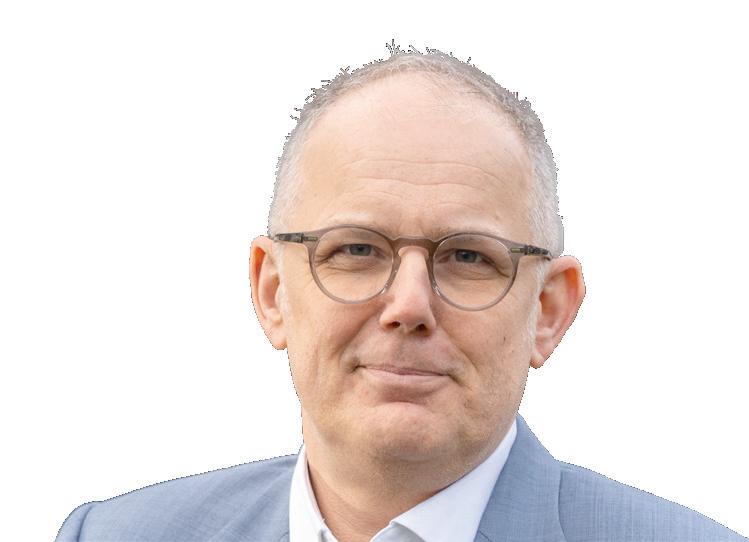
There was something different about this normally routine journey from Liverpool Central to Kirkby. Not just that it was a new train (the first of the new generation) but the way people were reacting to it. There was genuine excitement from some of the regular passengers. And the staff looked pretty pleased too - chatting away to passengers like proud parents. ‘Designed by you, Owned by you’, read the digital display. In practical terms, designed in Merseyside means features like level access to the platform, tip-up seats to allow more luggage and pushchairs, spaces specifically designed for wheelchairs, prams and bikes, as well as USB and plug sockets under the seats. ‘Owned by you’ also resonates in a city whose port heritage gives it a sense of itself as very different from more stolid inland places.
The joyful ride to Kirkby and back was an add on for me to a session we held for Urban Transport Group members to share approaches to franchising and to zero emission buses. A session where we found out more about how, as well as pushing the envelope of what a commuter train can be, Merseytravel is also doing the same for the bus. The new hydrogen bus project pushed the manufacturers to remove pain points and the designers to come up with something special - really special.
Even the bad boys and girls at the back of the bus now get their own individual seats - and like the rest of the seats they could teach long distance train operators a few things about what a comfortable seat feels like. Out go the
excess of poles - creating less of a monkey cage feel. In comes accent lighting and bamboo flooring. To take some of the tension out of the issue there are also two spaces for wheelchair users. The whole shebang is of course hydrogenpowered and like the trains these are buses that will be ‘designed by you, owned by you’.
The new bus is also a statement of intent about franchising not being just a mechanical legal exercise to contractualise private operators. It’s about a fresh start for public transport; ditching the husk of the tired and expensive pretence that public transport is some kind of free market (something it long ago ceased to be in any meaningful way) and replacing it with what it should have been all along: a green and progressive civic utility. Symbolised by removing the hotchpotch of distant unloved corporate brands to give public transport back its dignity. Actualised by ensuring that more of the farepayers’ and ratepayers’ money stays in the city region to ensure that nothing is too good for the public transport user.
There’s more too. Turning the city region yellow can also help turn the city region green. There’s the potential to use locally generated power from a new Mersey barrage or from the chemicals industry down the Mersey;
taking charge of transport land holdings can help realise development and meet local housing need. And all of this can help create good local jobs.
Meanwhile, on the other side of Chat Moss, in Greater Manchester, everything is also going yellow. All under the watchful eye of what is an inspired signing in Vernon Everitt (formerly of Transport for London) as transport commissioner. Taking on someone with experience of running a significant chunk of what is one of the biggest public transport shows on earth is what you need when you are looking to make Greater Manchester’s public transport look and feel more like what London already has.
With the roll out of publicly-controlled buses beginning in the autumn, Greater Manchester has been stepping things up on turning the local rail network yellow too. As well as fighting its way through the thickets of the rail reform process they are also looking to do a London Overground by zeroing in on six of the more self contained rail routes with a plan to turn them yellow and give them the full ‘Bee Network’ treatment (once all the buses are in-house).
In the shorter term Greater Manchester has also stepped up on tackling crime and harassment (and the fear of it) through making public transport the Eleventh District for policing. The Covid period led to public transport becoming a less supervised space and standards of behaviour notched downwards. ‘Always on’ comms is part of a much bigger picture of what Greater Manchester is doing on crime. But the comms helps highlight how action is being taken to counterbalance the drip drip of bad news in the local media.
All these positive local developments are taking place in the context of drifting national policy. As prime minister, Boris Johnson gave Andrew Gilligan (a true believer in active travel and buses) permission to ask for the stars, the moon and the sun in modal strategies from the Department for Transport - including the national bus strategy. The moon, the stars and the sun are all in those strategiesthe budget to reach those lofty heavens wasn’t. Nor was the leeway for local transport authorities to move a muscle to achieve those strategies without Gilligan signing it off.
Gilligan also wanted his version of what London has achieved to happen everywhere
In our city regions the public sector’s natural inclination to innovate for the public good is finding an outlet in transport again
“Turning the city region yellow can also help turn the city region green”
at five times the speed - but with five times less autonomy than London has. Now he is no longer king for the day, the direction of transport policy has splintered and deteriorated into a quagmire of unresolved preferences and prejudices of individual ministers and advisors in different parts of government as the modal silos of the DfT fight over where the axe is going to fall as a result of the freezing of the DfT’s budget. This in turn has led to the latest twist and turn in the chaotic tale of funding for buses outside London, with yet another short term funding deal to kick the can down the road (and past the local elections). This forever funding crisis is debilitating for those who could be spending their time looking to the future of public transport and is masking an even more drastic and disorderly shrinkage of bus networks than was happening before Covid. In effect, the sticking plaster of layering on short term additional funding packages to a broken system of bus funding is being pulled
off a little bit at a time, instead of in one go. Death by a thousand cuts rather than a single hit - and, same as it ever was, it’s those with the least who are the losers.
Meanwhile, rail reform seems to have gone one step forward and one step back. Whilst the secretary of state has taken it out of the deep freeze, we are back to where we were in terms of the railways being open to all comers who want to fight it out on the most ‘commercial’ routes (commercial only because intercity infrastructure costs are being dumped on local and regional rail). So we are now, apparently, going to have a simpler fares structure (but with more fares competition between more operators), and a more integrated railway (but with more brands and operators who have more freedom to do what they want). And that’s all assuming everything doesn’t turn red after the next general election. Good luck with that.
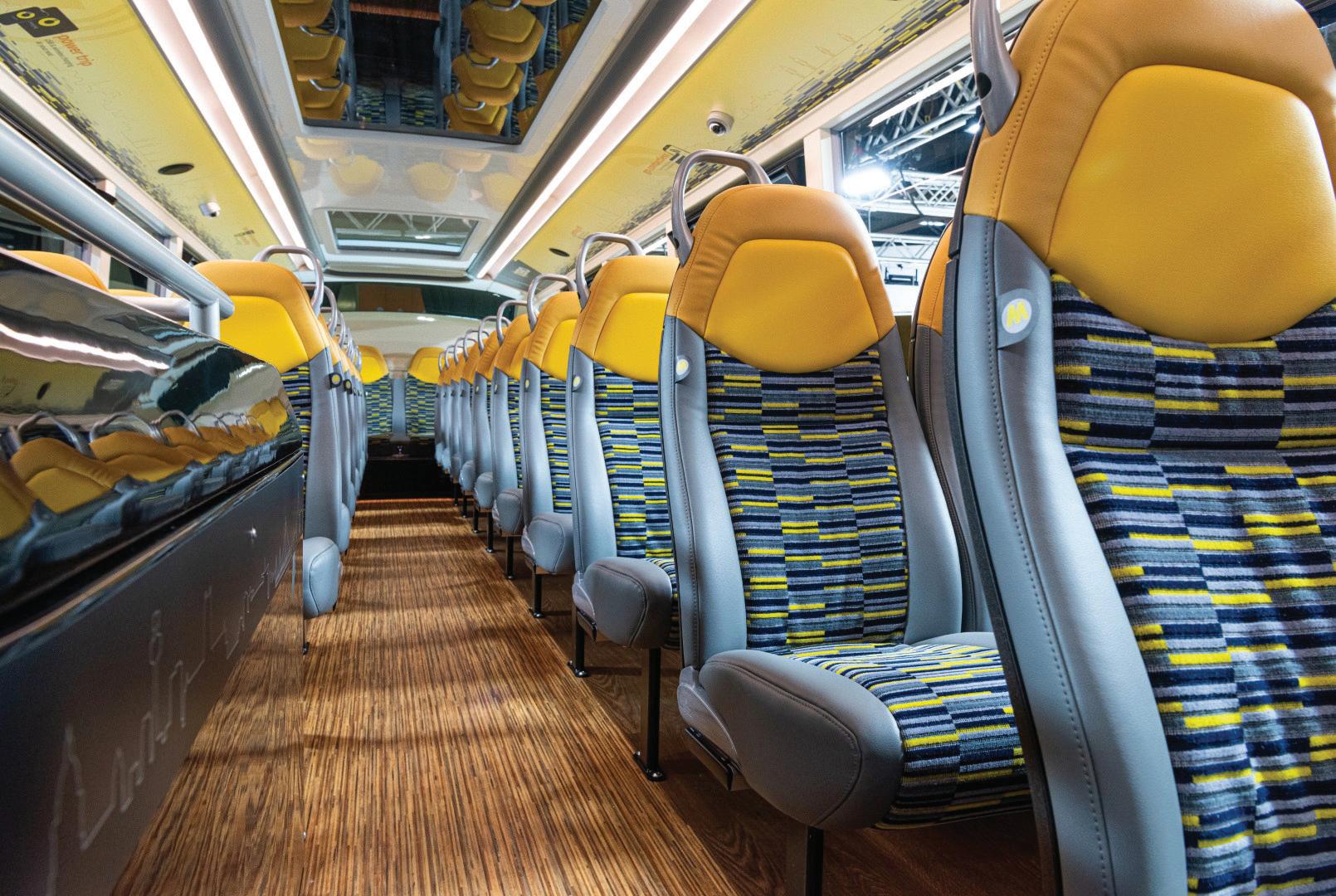
Meanwhile, in Tyne and Wear, everything
will soon be turning itself a brighter shade of yellow as the Metro gears up for a new fleet of ‘designed by you, owned by you’ Metro trains. It’s worth remembering that not only is the Tyne and Wear Metro arguably the only world class innovative transit system built in the UK in the 20th Century - it was also built in turbulent and unfavourable times for public transport. There’s a sense - as everything goes yellow in Merseyside and Greater Manchester - that the public sector’s natural inclination to innovate for the public good is finding an outlet in transport again.
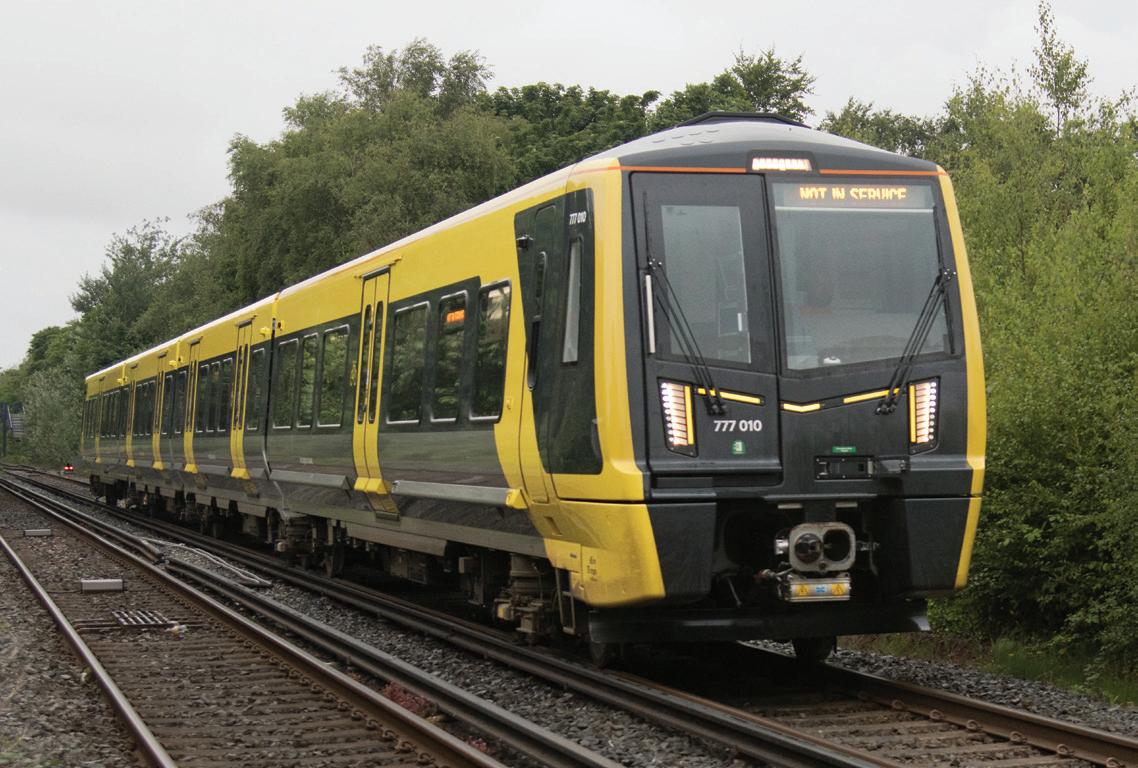
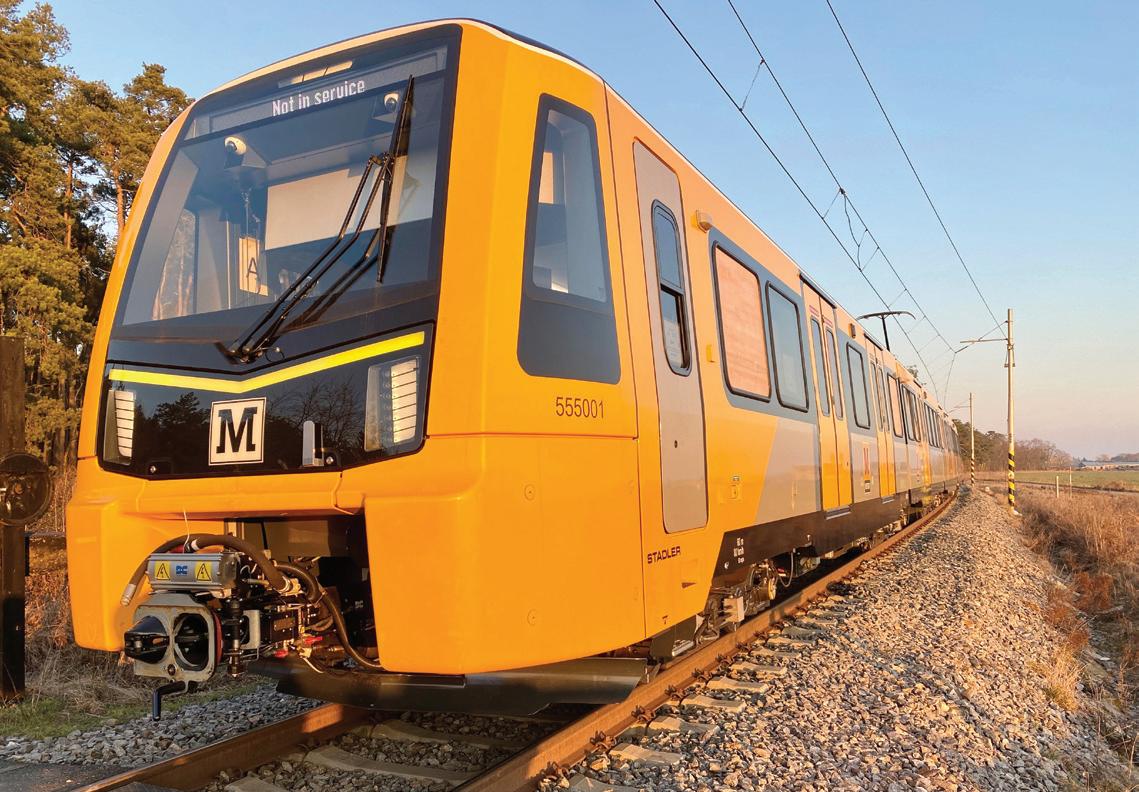
Jonathan Bray is the director of the Urban Transport Group. Throughout his career in policy and lobbying roles he has been at the frontline in bringing about more effective, sustainable and equitable transport policies.
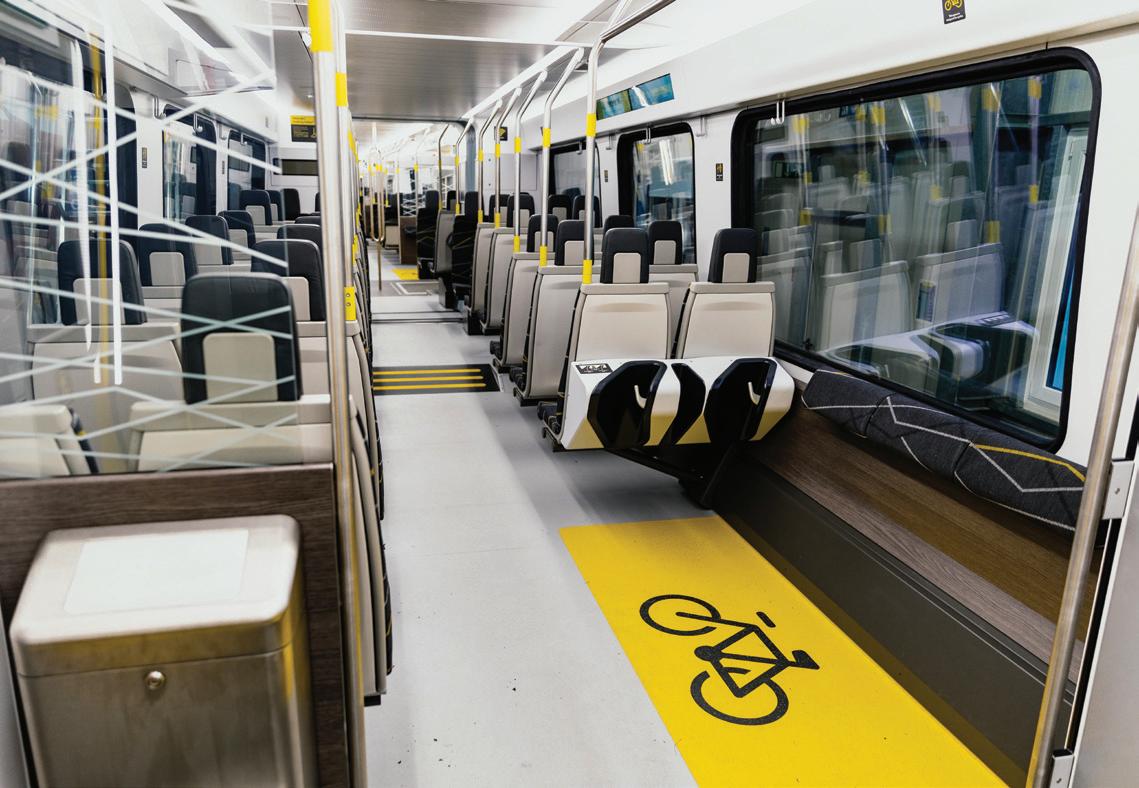
“Positive local developments are taking place in the context of drifting national policy”The interior of Merseyrail’s new trains The Tyne & Wear Metro is also getting a new fleet of trains ‘Designed by you, Owned by you’. Merseyrail’s new trains

A couple of weeks ago, I was having a few chinwags with folk from outside of the transport sector, finance bods and the like, and they were slightly sceptical about the trajectory for UK bus. A pal of mine in our industry was having similar chats and we were both adamant the future is actually positive, arguably more so than for several years, despite recent research from The Guardian recently showing 10% of local bus routes have been cut over the last year.
Talking to bus industry leaders, views tend to be polarised. My ‘inbox’ was littered with CVs over the festive break from folk in ‘new year, new job’ reflective period, wondering if they had the energy for another 12 months on the treadmill, of trying to drum up patronage, facing constant pressure to cut costs, uncertainty around continued postCovid support and the shackles of demanding employers and private owning groups with, in some cases, no background in the sector.
Speaking to one hugely experienced bus company bigwig recently, he lamented that the £2 fare cap in England hadn’t actually attracted new customers and in effect was merely abstracting revenue. In many respects the special offer came round too quickly, such that a proper, multi-channel marketing campaign wasn’t developed, the kind that a special offer of this magnitude actually would have enjoyed in many other sectors, including (admittedly expensive) radio and maybe television advertising as well as swamping every household with leaflets.
Of course, the other Herculean challenge is driver recruitment, which isn’t getting any easier and from my own mystery shopping is preventing us not necessarily from attracting friendly drivers, but I’m coming across many that lack product and geographical knowledge - the kind that experienced bus drivers of many years naturally imbue. On the flip side, there are others who are fuelled by optimism as well as a reflection that the grass isn’t always greener on the other side - one look at colleagues in the rail sector is a salutary reminder of just how lucky they are in bus, by comparison. There are a number of reasons why I’m definitely in the positive camp right now. Firstly, the extension of the £2 fare deal is a very positive indicator that the government
recognises that this is a sector worth investing in. Would it commit to something that it felt was genuinely on borrowed time and where there was a better alternative?
My optimism around the bus sector is also derived from the green agenda. I’ll be totally honest and I know this may make me susceptible to opprobrium being foisted upon me, but the environmental cause in relation to transport is something which I’ve found interesting, but not as compelling as other industry observers over the years. I was sceptical that it was as important as some might have otherwise thought, or pretended to do so to fit their own narrative. However, a mix of Covid and old age has changed that for me. The pandemic created a re-set in thinking among many of us, a greater appreciation of nature - of hearing the sound of birds prevailing over the noise of cars and of air that was discernibly fresher than at any other time in our lives.
Then, so rapidly post-Covid, environmental initiatives, that were previously limited to bullet points about the future in presentations, also felt tangible and real for laymen such as I. Suddenly, copies of Passenger Transport regale me with driverless buses over the Forth Bridge at Stagecoach East Scotland and electric vehicles at their sister company in Highlands and, admittedly, because I’ve met both their MDs recently, I can relate to what they are saying and see that it is actually happening.
When I hang around street corners, I also see electric charging points, meticulously segregated recycling points, the end of plastic packaging and much more - there really feels there is no going back - a bit like the point I knew there was no alternative to this thing called a ‘Wallet’ on my phone which I now have to use for tickets for sporting events. Throw in the fact that I’m surrounded by three youngsters in our house who are not only very PC but talk about the environment, and I realise that the youth of today, in the main, aren’t getting drunk, acting promiscuously, being offensive and taking drugs, like perhaps my generation and our predecessors were.
All of the above is good news for buses and we know that this is a reason why private investors are interested in investing in the sector and the owning groups. They can see that the green agenda plays into the hands of our industry and we are well progressed down the road to capitalise on it.
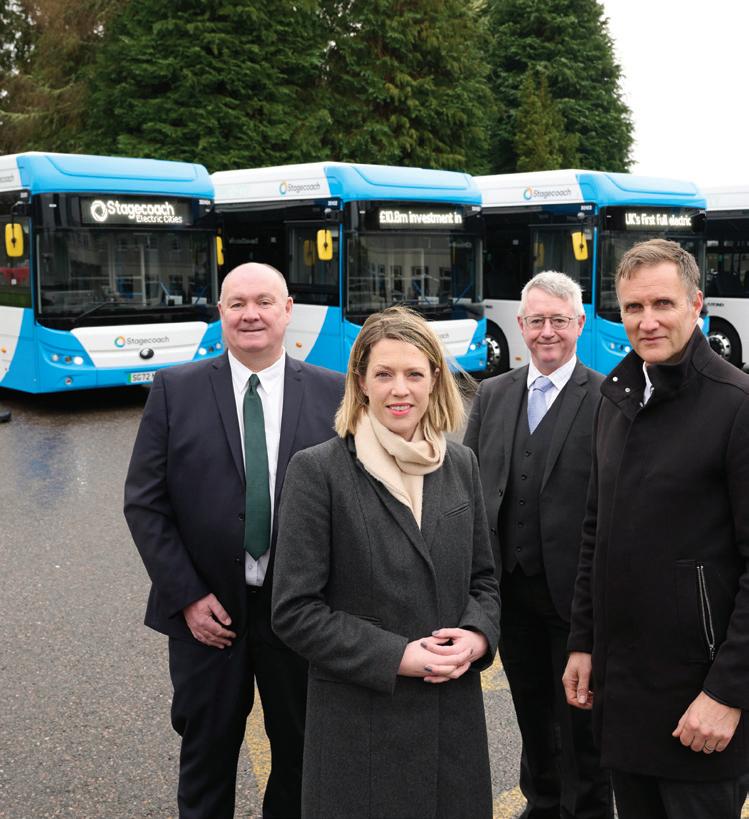
It’s easy to grumble and I’m normally worse than most, but I’ve never felt so good about the bus sector in the UK - and here’s why
Furthermore, if an outside investment fund or perhaps a bus heathen were to get on board a bus, they would, I imagine, be stunned at the improved quality of interiors than when they maybe last travelled by bus. Leather seats, swish branding, chargers, free Wi-Fi, apps and contactless are a fierce riposte to those with deep-seated misconceptions rooted in yesteryear about our sector.
Grumpy drivers too - with each passing month, I think we are seeing fewer of them, despite the challenges faced in recruitment. I don’t believe there has been a lessening of standards and not just from the many mystery shopping reports that I have presided over. I am seeing far fewer instances of miserable folk at the wheel. When I also do vox-pop surveys among customers, the issue of rude drivers barely, if ever gets a mention. Better training and a realisation among drivers that the sector has been in a fight for survival has, I believe, stigmatised rudeness among peer groups. Employing a more diverse workforce and with a greater emphasis on gender balance has also helped, so too the societal ostracising of words and behaviours that might have been acceptable or gone unchecked in previous eras.
As I’ve oft stated too, the pandemic also led to a lessening of social mobility not just in terms of people now being less inclined to go out (bad news for the sector, of course), but where mobility now exists it is less ambitious and more localised (good for buses, bad for longer distance travel such as rail). Doorstep domestic sojourns for pleasure are also fashionable and speaking as someone who set up Great Scenic Journeys, a business that promotes and accredits from a customer service perspective nearly 100 routes (most of which are bus) across the UK and helps companies transform them into tourism products, I speak with confidence. So many bus services are stunning in terms of scenery as well as full of interesting sights, even those that might not at first glance seem like the kind that would be worth travelling on just for the experience of looking out of the window or stopping off end route. I’ve seen at first hand the surprise, joy and awe of customers of all demographic types as they travel on many bus routes across the UK and that feeling of delight and satisfaction when they compare it to a more expensive overseas or leisure experience. “Much more fun and far better value than Alton Towers,” were the words I heard a customer tell
a driver on First’s Exmoor Coaster last week. I also think that the culture of the bus industry puts itself in a better position to succeed. I’ve spent the last few weeks in and out of bus depots and HQs, with frontline staff and bigwigs. I genuinely see at all levels a far greater sense of togetherness and shared purpose among frontline employees and their managers, and also with their suppliers. It seems much more in unison than comparable other sectors that I have worked in, such as rail and Royal Mail, for instance. There does seem to be a sense of rallying round in adversity, but also a grounded demeanour at the top of organisations. Even though they act competitively, bus industry senior management teams are far more collegiate with colleagues from rival companies and take a mature, open and honest approach to dealing with collective problems facing their sector. There’s a greater willingness to fast-track high performers into gaining more experience quickly but also an infusion of talent from outside of the sector. My hope, though, is that newcomers get the bus bug quickly and are not just exploiting the sector to further their careers and then leave. Retaining talent remains a key challenge.
From an organisational perspective, I also believe that, whilst nothing is perfect, all of the major owning groups are doing some good things currently. I’m not saying some haven’t lost their way a little or are treading water, but there seems to be focus on the customer proposition. In the bad old days, you would see a grubby bus on the road, or a rude driver or buses wouldn’t turn up and it would be easy to identify the owning group. Now there is no company that is backward in its approach or general performance and even if it feels a bit ‘much of a muchness’ at times, those comedically bad journeys are few and far between. Vehicle maintenance and failure rates seem less of an issue as the training and competence of engineers has improved alongside new vehicles and better diagnostic approaches and innovation, as well as enhanced maintenance technology and depot premises.
From a structural perspective, the owning group bus divisions are set up either with big regions (First), greater centralisation and smaller operating companies (Arriva), somewhere in the middle (Stagecoach) or a localised approach (Go Ahead). Once again, none of these approaches appears to be failing,
though a common perception in the sector is that Go Ahead’s approach, which has also been consistently adopted over generations, seems to be the most successful in terms of producing popular products that resonate with the local markets that bus companies exist to serve and create happy management and frontline teams. It remains that the more fragile nature of bus industry margins means that from a resource perspective your average manager will have a more varied and wider remit than in, rail by comparison, or other sectors. It’s certainly more hands to the pump, which may be a deterrent for those who like a cushy life, but if it’s an interesting portfolio and the chance to make a difference at a young age, as well as the opportunity to spend time getting to grips with the fascinating nuances of local markets, then the bus sector is the place to be.
I’m not necessarily saying that in years to come we’ll look back on this era as some kind of golden epoque, nor that all in the depot is rosy, but I do believe there needs to be a reflection that there are reasons very much to be cheerful. My 18-year-old son this month spent a few days working alongside me on an assignment with First on their services, in their depots with drivers, engineers, cleaners and with key external stakeholders. He’s nowhere near a bus nerd like me, but he thought all the people he met were “absolutely sound and down to earth” and they made him extremely welcome. The customers were fun to deal with, so too tourism partners, and the customer and commercial dynamics on the hugely scenic routes we travelled on were fascinating - and he could see the decent career prospects. He’s not quite signed up to a career on the buses just yet and is keeping his options open, but his experience made me feel even more positive, at a time when I’ve never felt so good about the bus sector. It’s easy to grumble all the time and let’s face it on these pages I’m normally worse than most, but with a bit of reflection and a ‘glass half-full’ mentality, it’s actually not difficult to look to the future with vigour and more than just a sprinkle of optimism.
Alex Warner has over 29 years’ experience in the transport sector, having held senior roles on a multi-modal basis across the sector
“The extension of the £2 fare deal is a very positive indicator”
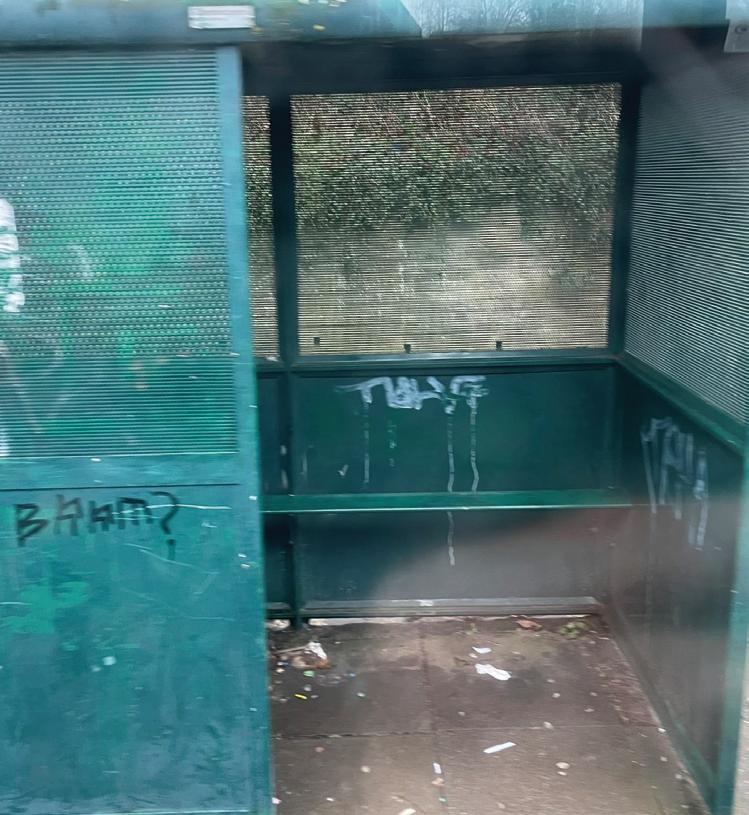
people say. It’s so much easier to sit on your fat arse and do nothing all day, but that doesn’t make it a wise choice.
Many people have no problem now in sorting their rubbish into recycling and landfill; not too much of a palaver. Not long ago it would have been a right pain. Dedicated smokers mostly accept the need not to smoke in an enclosed space with other people. You seldom hear anyone say they drive better after a few drinks any more. Life isn’t always about doing what’s easiest or best for your needs; it’s about doing what’s right and honourable for humankind. Habits, if harmful, can be changed if we are determined; should be changed, must be changed. And if we make the new choice really nice, there’s a better chance it will happen.
Although the word omnibus means a bus for everyone, this is not the case when it comes to perceptions of and attitudes towards the bus. We’ve made great strides forwards in making buses easier to use for anyone less mobile or with, for example, hearing or sight problems, and quite right too. But to get more people to think positively about using buses more, the bus must truly be an omnibus and appeal to those who dismiss it as not for them.
It is imperative we make fundamental changes to how we conduct ourselves in relation to the environment and the choices we make about our future and this planet’s future. It is widely accepted that we should seriously consider using public transport far more when it is a viable option. Consciousnesses are being pricked (even though we still have pricks with no conscience). With, potentially, a willing market ready to be satisfied, why the hell are so many transport businesses not going all out to make public transport unbelievably attractive and appealing... and making it easier for people to make that leap of faith?
Of course, the current appeal and perception of the bus is very much tied up with society’s attitude to buses. That dreaded phrase, loved by local and national politicians, “those who depend on the bus”, reinforces the all-toocommon prejudice that the prime function of the bus is that of a last-resort utility for an underclass, and if you’re on one, you’re nothing. It is too easily accepted that the car should not only be the default choice of travel mode for
any journey but the preferred mode, come what may. These attitudes are there all around us and we are not doing anywhere near enough to counter them. In fact, we’re reinforcing them by doing so many things badly that it makes it hard for people to change.
Well, if we’re going to save the planet and make this earth a much nicer place for future generations, the bus has to be more appealing to more people. We can’t go on allowing the toxic, selfish sense of entitlement that many car drivers believe gives them licence to go wherever they want, whenever they choose and have several places to leave their car while they’re doing it. It’s not sustainable, not appropriate and deeply damaging. “Oh it’s so much easier to just jump in the car,” you hear
If the general public’s attitude to buses needs changing, unfortunately so does that of some who work in our industry. Don’t get me wrong; we have an army of fiendishly, fervently dedicated believers and proponents of public transport who love this industry and are passionate about it from top to bottom, but not all, unfortunately. Some have no real passion, no belief; it’s just business, a wage.
There’s a lean towards adopting the latest fads in management processes, sometimes at the expense of the oh-so-important, nittygritty detail of what you’re actually managing; following a pattern-book theory that can be at odds with reality. And surely you get the best out of people by capitalising on what they can bring to the table rather than pigeonholing them into the latest management-speak job description, possibly clipping their wings rather than helping them and you fly high. And there is a creeping bias to regard those with a passion for public transport with suspicion, distrust and even open disdain. That’s nuts.
The bus industry has a terrific role to play moving forwards. But surely we should take a reality check and see ourselves for what we are. Our product - a journey by bus - is not, nor should be regarded as, a factory produced standard item that is identical to every other and churned out of a machine at the cheapest possible cost to that business, come what may. That’s how to make chocolate digestives or tins of Vim, not bus journeys.
Despite the size of some businesses, their need to produce profits - perfectly OK - and their span across the globe, we are in essence an artisan business selling bespoke products

If we want people to change their travel behaviour and switch to buses we must also change the behaviour of some in our industryWould this persuade you to leave the car at home?
where the relationship between the provider and the buyer is best when its personal. The real service we provide - comfort, cleanliness, style, personality, interaction between driver and customer, dealing with enquiries, the places we go to, etc, can be subtly or widely different in different areas and depend on the type of customer - age, background, social or economic status, ambitions, which side of bed they got out of and many other factors. It’s not the standardisation of the ‘product’ that drives customer satisfaction and repeat business, it’s the personality, warmth and bespoke nature of the experience; the intimacy of the relationship between the customer and the company and understanding that customers are wonderful, individual people, not merely data or statistics. Chain pubs know this only too well.
Of course, it should all be to a uniformly high standard, but what adds the personal touch is not just the icing on the cake, it’s all the different cherries on the different icing on the cake that makes the whole thing work, although sometimes it’s a chocolate flake or hundreds and thousands or a squirt of cream instead of a cherry... as any astute artisan business knows.
Just recently I heard of one manager who actually believed, hand-on-heart, he didn’t have to do anything to attract customers; it was a waste of time and money as they’d just turn up ad infinitum because they had no choice. And he was being paid a fat salary to spout such dangerous rubbish. We must make the bus a means of transport that people want to choose and delight in choosing. We’ll never get those numbers up if we still think it’s OK to fob our customers off with the cheapest, least-attractive solutions, because they have no choice. Customers do have a choice. They can choose to look for alternative ways to get to where they were going or find ways to travel far less often. And they can moan over the garden fence about how awful you are. And they will if you merely regard them as statistics on a spreadsheet. In one way or another, we should be delighting our customers every time they travel with us. We have to make the next journey better than the last one. That’s the modus operandi of the best, most successful retailers.
A bus belonging to a major group was spotted in early February still decorated and wishing its customers a happy Christmas. Where’s the harm in that, some might say. Actually, it’s corrosively, tragically harmful,
made worse when you hear groups comparing themselves with the better high street retailers. I can’t see M&S or John Lewis allowing their stores to show such lack of care as to how they present themselves. It’s shoddy and shows a completely offhand attitude to customers and they will notice it.
As I have pointed out previously, despite pockets of excellence, we continue to get so many things wrong. Even before we get on the bus we have filthy, unkempt, disgusting bus stops and scary shelters. My friends and I have found ambiguous, misleading, indecipherable, badly presented and out-of-date information on display, even timetables a couple of years out of date. That, if not actually criminal, should be. It is certainly a mortal sin and a grave dereliction of responsibility.
How often do we hear these days of bus companies no longer printing timetables because it is all online. Really? There are good websites out there but there are many truly appalling ones that are difficult to navigate unless you have a fair bit of prior knowledge and know some of the answers to your questions first. Or are fully fluent in tech. For example, you would have thought a fundamental thing would be to set your stall out and tell potential customers where you can take them. “Where do you want to go?” “Well, where can you take me?” “If you don’t know, I’m not telling you, mate.” That’s sometimes the size of it.
You can have a corridor where there are several bus routes giving a decent frequency, but the website forces you to look at every timetable separately, assuming you know all the different route numbers in the first place, and then do your own arithmetic. There are timetables badly presented in different styles with different names on different timetables for the same location. There are websites where you have to know the number of your bus first, journey planners where if you put in the town name, you can’t get any further until you choose the actual stop even though you have no idea where that is in the town. There are maps and bus stops for some routes but not always, some where no-one could be bothered to present complex different routings in a way that anyone can understand, indecipherable footnotes and codes... It goes on.
We have buses that rattle alarmingly, whir and buzz deafeningly, are uncomfortable and cramped with torn, worn and grubby
upholstery, chipped paint, things held together by tape. We stick nasty, threatening, patronising and hard-to-read notices and instructions up all over the place, and still think its OK to cover windows with them.
A number of people have got on the Witchway in Lancashire and have been so gobsmacked by the experience they have gone on social media that instant to tell everyone that they never believed buses could be that amazing. People taking the bus between St Helens and Liverpool will shortly experience a real uplift to their travelling experience because forward-thinking managers have realised they have to create desire for travel (shameless of me to put it that way, I know, but it’s what my life is all about).
Car manufacturers are relentlessly (and misleadingly) selling the dream of freedom through empty city streets (often speeding around with alarmingly dangerous manoeuvres). Every ad break on a recent ITV hour-long programme had car ads, plus ones for secondhand car platforms. That’s what we’re up against - the state religion that a car is the god that has to be worshipped and we must have more and more of them to worship.
We have a massive hill to climb and the first step is to make the product something people will be seduced by; not some of the lacklustre apologies that are out there at the moment. We can’t expect people to make the switch purely by conscience, tech and cheap fares. We must make going by bus an uplifting, thoroughly enjoyable experience. We have to make the effort, put in the hard work. It requires a complete sea change of attitudes and approaches and influencing how others see us. We’ve really got to set our stall out - as that artisan business that really knows how to encourage, surprise, delight, charm, cosset, and truly adore and love customers, and love the product we provide for them. We must make their journeys with us fabulous, every time, and every time better than it was before. I think the word I’d use is desirable, don’t you?
Ray Stenning is the award-winning Design Director of Best Impressions, which provides creative services to the passenger transport sector. Email ray@best-impressions.co.uk
“We must make going by bus an uplifting, thoroughly enjoyable experience”

The National Planning Policy Framework (NPPF) first landed in 2012 and replaced all previous planning legislation which, in government’s view, had become bloated and unfit for purpose. Despite successive amendments, it still hasn’t recognised transport fully, but the current round of consultation on a further edition provides the opportunity to get it right. This has implications for passenger transport providers regarding developments that enable passenger transport services rather than perpetuating car-dependency.
NPPF sets the context in which all planning and development decisions must be made. This means that Local Plans, the means by which every local planning authority decides where development sites should be allocated, must conform with it. However, the process that creates Local Plans remains tortuous, prone to legal challenges and results in plans becoming out of date as soon as they are adopted. If for any reason there are delays in the local planning process, then this opens up a vacuum which is a bonanza for developers because they can claim just about anything because there isn’t a Local Plan in place to which they must conform. This means that the whole system doesn’t work as a planled arrangement and instead becomes an appeal-led process. When this happens, recourse is made to NPPF which should
provide guidance on suitable development proposals given that its mantra is to promote sustainable development. The problem has been that in not understanding transport coherently, development sites can be approved that are appalling in access terms. There are lots of examples of new housing estates that are designed for cars with any nod towards walking and cycling routes being a secondary consideration. Locating business parks and similar in places where employees have little option but to drive there is the planning ambition of the past. By the same token, ensuring that there is adequate access by bus services does not rank highly and developers can make absurd claims about how residents will be able to use bus services even if there aren’t many and they are miles away. In other words, NPPF in its current form is hardly leaning towards passenger transport to development sites when it should be.
This may all sound a bit extreme but it happens all the time. Recently, I was expert witness at a public inquiry acting on behalf of a highway authority to resist a development of over 200 houses on an urban fringe greenfield
site. There are currently no frequent bus services nearby apart from stops which are a 30 minute walk away and a rail station which similarly requires some determination to reach on a regular basis; there are no shops or other basic facilities nearby either. The adjacent residential area is almost entirely car-dependent so imagining that the new residents would somehow embrace sustainable transport was simply absurd. I presented evidence on this basis and by and large the Inspector agreed but the developer’s appeal was successful because the need for housing apparently outweighs transport considerations or anything else. This is how appalling housing estates continue to appear with their legacy of poor access to the detriment of local areas, an embarrassing indictment of the current planning process.
NPPF doesn’t help. For one thing, it presents a view that electric vehicles are a good thing and can be considered as ‘sustainable’. This emerges from a government that thinks that nuclear energy is sustainable so there are some basic problems to overcome. There are many other difficulties including the obsession with infrastructure, but scant consideration of services such as local buses. Fundamentally, a site cannot be considered as sustainable if it is poorly located in transport terms but NPPF fails to give accessibility the emphasis it deserves. Strangely, it talks of sites which ‘can be made sustainable’ as if locating them in the wrong place can somehow be remediated by a couple of footpaths and a cycle rack. It seems that despite a requirement for NPPF to reflect other national policies, it simply doesn’t because it helps to perpetuate car-dependent communities.
For larger sites, a Transport Assessment is required. Unfortunately these tend to follow a common structure, often at least 95% discussing car access, highway link and junction capacities and measures that would accommodate additional car demand. Only then does any discussion of bus or train access appear, usually inadequately. For example, the site I was defending at the public inquiry was apparently going to have the same proportion of bus and train users as any urban area, including those which have decent levels of bus services and a convenient rail station. Any sense of professional credibility seems to elude
The planning system was simplified to the detriment of sustainable transport but this may just be about to change
“Some of the lesser deficiencies in NPPF could be overcome relatively easily”
site promoters who will promise anything, particularly if they don’t have to do much to achieve it. It would be timely to re-write guidance on Transport Assessments to start with walking, cycling and passenger transport, then move on to what should be the residual demand for car use. Any proposal that cannot demonstrate sustainable access should be rejected outright because that is the only way of conforming with wider policies. The thorny issue of the need for housing should not be the golden ticket in the process.
Some of the lesser deficiencies in NPPF could be overcome relatively easily. For example, mention of ‘the availability and opportunities for public transport’ does not require an analysis of what is possible, who will provide it and how much the developer will need to contribute towards it. This business of ‘developer contributions’ is another can of worms; it isn’t a contribution by a developer anyway, it’s a cost incurred set against the land value which is supposed to mitigate for the impact of the development. These contributions are often inadequate and don’t compensate for generations of additional
demand for car use. Local authorities have what are termed ‘development control’ staff, although in practice they have very little control over development because their hands are tied by the planning rules. They can however determine the upper limit of car parking provision for different land uses but developers maintain that providing car parking is what the market requires - it doesn’t necessarily need space for parking but setting minimum levels of bus access for example would be a real shock. If sites can be rejected because there is poor vehicular access, then surely they should be rejected if there is a lack of sustainable access. Above all, NPPF needs to recognise that transport issues are a fundamental determinant of planning decisions, not an adjunct to other issues to be overlooked when proposals fail to address key access requirements.

Back in 1994, Planning Policy Guidance (PPG) was in force, one part of which, PPG13, covered transport. At the time this was considered a bit woolly and was largely ignored
anyway but in retrospect, it still has relevance despite being abolished when NPPF came into being. PPG13’s key aims, with reference to the then ‘Government’s Sustainable Development Strategy’ (sounds familiar?) included:
Reduce growth in the length and number of motorised journeys;
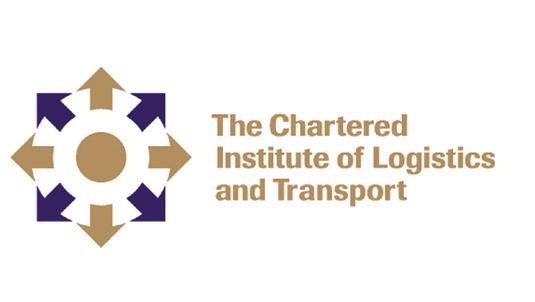
Encourage alternative means of travel which have less environmental impact; and hence Reduce reliance on the private car.
Nearly 30 years later, the planning process has yet to embrace fully the transport principles set out. Revisions to NPPF must deliver or we will see yet more inappropriate developments without adequate passenger transport and no hope of securing it in the future.
Nick Richardson is Technical Principal at transport consultancy Mott MacDonald, chair of CILT’s Bus and Coach Policy Group and a former chair of the Transport Planning Society. In addition, he has held a PCV licence for over 30 years.

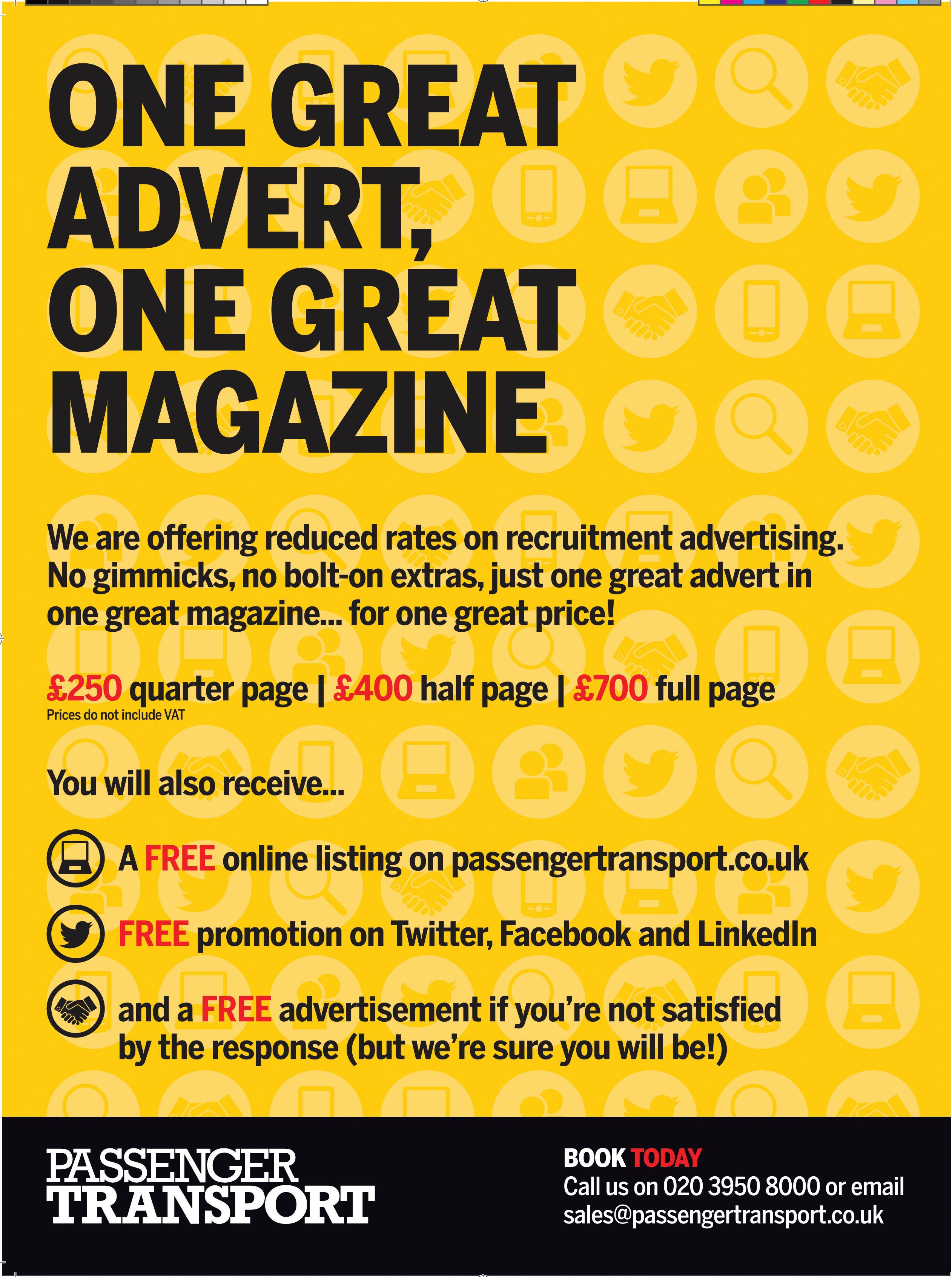

It’s a wonderful irony that the traffic commissioners, who are of course appointed by this department, should consider it necessary to issue a statement temporarily reducing the notice period for the deregistration of bus services to 28 days. They cite the “uncertainty over funding” as the reason to give operators a bit more flexibility in their decisions on whether to withdraw or reduce services, for as long as this uncertainty hangs over the industry. It feels like the traffic commissioners have given us a bit of a slap on the wrist. Perhaps it stirred us - or the Treasury - into action, since, as I write, we have just announced a three-month extension of the £2 bus fare cap backed by £75m of funding, with a further £80m until June 30. Welcome as this is for the bus industry, we still aren’t providing anything like the kind of long-term funding that transport authorities and bus operators really need if they are to plan ahead with any certainty. How the industry is meant to plan ahead within such short-term funding packages beats me! Indeed, uncertainty hangs over much of the public transport sector, both bus and rail, like a dark cloud. We still don’t even know where the new headquarters for Great British Railways (GBR) will be. The competition was announced way back in October 2021 with a deadline for submissions being March 16, 2022 - almost a year ago. Ministers have recently said a decision on the winner would be announced before Easter. Fine, but why has it taken so long to select the winner? Was the
evaluation process really that complicated? When the competition was announced the evaluation criteria were made public: alignment with the levelling up agenda; connected and easy to get to; value for money; public support; railway heritage and links to the railway; and opportunities for GBR. These don’t strike me as complex criteria against which to assess the bids. Yet it will have taken more than a year to assess them and make an announcement. The whole process just seems so slow.
There is, of course, also uncertainty over the future of HS2 with reports of a root and branch review of the project to be carried out. There is ongoing speculation that the easterly leg from the West Midlands to East Midlands Parkway could be scrapped, and the
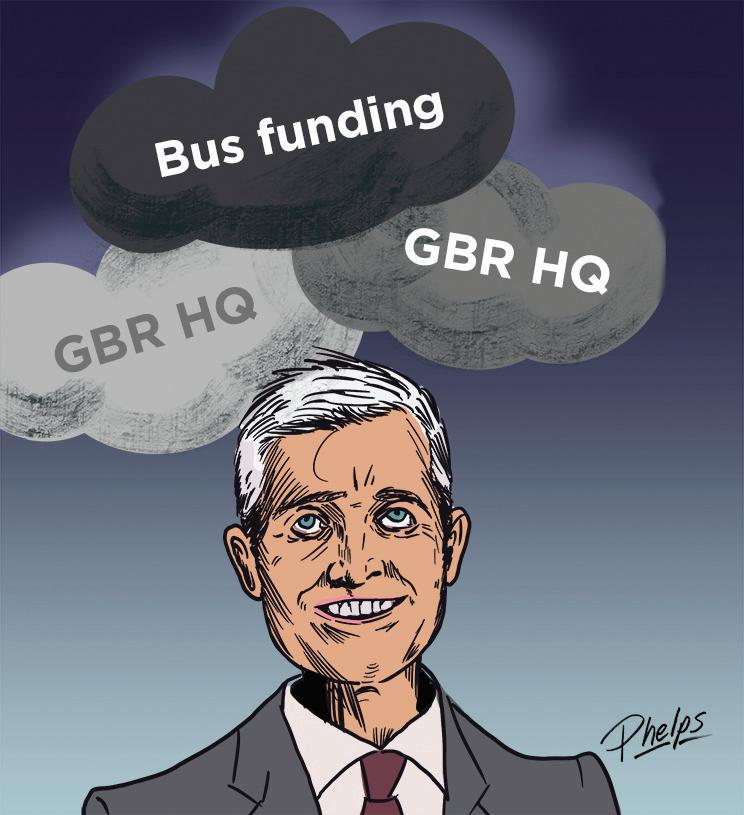
section north of Crewe scaled back to run on existing track. There’s talk of delays in opening the line, to cutting line speeds and reducing the number of services. The whole project is beginning to look so fundamentally different to the original proposition when the then Labour secretary of state for transport, Lord Adonis, first gave the go-ahead all those years ago that you have to ask whether there is still any real justification for the project.
One of the original justifications was that the West Coast Main Line was full, certainly on the southern section from London to the West Midlands, and that new capacity was required. But I have a strong hunch that there is no longer a capacity problem on the West Coast Main Line now that services are reduced, and I suspect services will remain at reduced levels for the foreseeable future given that train operators are being required to reduce costs by at least 10% - and the only way they can do that, or at least the easiest way, is by reducing services.
I also have a hunch that the business case for HS2 has gone up in smoke. Is anybody going to be brave enough to say so? Ministers have a tendency to shy away from “brave” decisions - as any aficionado of the Yes Minister series will recall, when Sir Humphrey Appleby happily advised his minister, Jim Hacker, that a particular decision was “brave”, it ensured that said decision was not taken - but it seems increasingly likely, if not necessary, that some pretty brave decisions over the future shape and size of HS2 are going to have to be taken. I know there are many people who are evangelical in their support for HS2. Could we imagine life today without the M25, a project fiercely opposed by the Treasury at the time? They will argue that HS2 has the same strategic business case. Perhaps. But the world has changed, and changed pretty fundamentally, since it was first conceived. Its costs, moreover, have sky-rocketed since the go-ahead was first given and it wouldn’t surprise me if the final costs in cash terms could be close to £200bn. Nobody has the benefit of hindsight, but I wonder if Lord Adonis would have given his approval if he knew then what we know now. By the time HS2 is completed - assuming it isI have another hunch that our transport needs, and transport technology, will have changed pretty dramatically, further reducing, if not eliminating, the need for HS2. Be brave, Mr Harper, be brave.
Our Whitehall insider imagines what’s going on inside the minds of the mandarins at Great Minster House, home of the DfT
“It feels like the traffic commissioners have given us a bit of a slap on the wrist”
First Bus has announced the appointment of Simon Mathieson into a new role as the head of operational excellence.
Mathieson (pictured) joins from Arriva where he was latterly area operations director. That role followed a career spanning roles from operations manager to operations director and then managing director.


Commenting on the appointment, First said Mathieson has a successful track record of 20 years’ experience delivering performance and cultural improvements in the bus industry across several different roles. In this new role Mathieson will report to Andrew Jarvis, the chief operating officer for First Bus, and he will also work closely with the head of engineering excellence, Tony Cockcroft.
Pawel Polewski has been promoted to operations manager at Go-Ahead subsidiaries
Thames Travel and Carousel Buses, which form part of the Oxford Bus Group.
Polewski (pictured) first joined Thames Travel in 2018 as a commercial and planning officer. Promotion quickly followed to the position of planning officer and then service delivery manager where he was responsible for managing the control room and driver compliance.
A further promotion saw him move to operations manager for Thames Travel and this position has now been expanded to include management of Carousel Buses.

Council-owned bus operator
Ipswich Buses has announced the appointment of Dan Bassett as managing director. He will join the operator in May following the decision by Heath Williams to retire from the role.
Bassett (pictured) joins Ipswich Buses from fellow municipal Reading Buses, where he is service delivery director. In his new role he will take up the reins and provide leadership to 150 members of staff and provide strategic and operational direction for the 80-vehicle operator.
“I am really looking forward to joining Ipswich Buses and continuing its rich, 120-year history of delivering for its customers and contributing to the success of the town,” commented Bassett on the role.
Growing ground transport specialist

CMAC Group has announced
Dave Rose has been promoted to the role of director of supply and procurement.

Rose (pictured) joined CMAC in January 2022 as head of enterprise to drive international expansion. He brought over 15 years’ experience in the global taxi and small vehicle industry to his role at CMAC. Immediately prior to joining CMAC, Rose was at AutoCab where he headed the IGo taxi platform and app. Autocab was sold to Uber in 2019.
“Dave’s promotion is part of our drive to build on the fantastic success we had in 2022,” said CMAC chief operating officer Neil Micklethwaite.


Social media became captivated earlier this month when plucky comedian and writer Emily Turner revealed she was planning to take advantage of England’s £2 bus fare cap by travelling from London to Scotland using local bus services. “It’s something that I’d been thinking about doing for years,” she explained. “I love buses as a way to see places, putting my headphones on and just watch the world go by.” Emily set off on the morning of
An investigation has been launched after rail minister Huw Merriman’s laptop went missing... from a pub in London’s West End. Apparently the device went
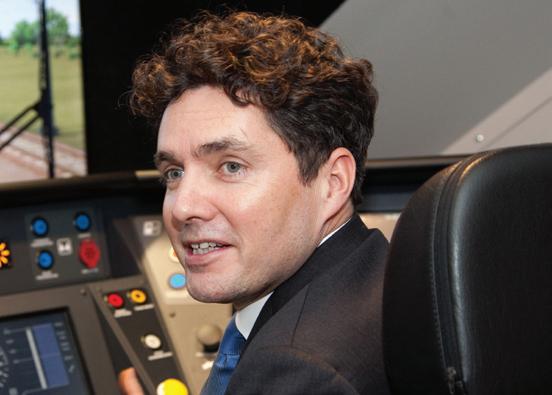
Friday, February 10, departing on the N253 bus to Tottenham Court Road in the early hours of the morning. Assisted by Twitter’s legion of bus spotters, she made it all the way to Pontefract in West Yorkshire by
missing on the evening of February 2 and it is believed to have contained confidential information about negotiations concerning the industrial unrest on Britain’s railways. Sources close to the Conservative MP for Bexhill and Battle said the theft from the pub in James Street, Covent Garden (after checking out the online reviews, we’re putting money on The Nag’s Head rather than The White Lion) was reported to police and to government officials as soon as it was noticed.
the evening, where she stayed overnight.
On Saturday she rode through the north of England, reaching Northumberland and staying overnight in Alnwick before continuing to Scotland on Sunday. She finally arrived in Edinburgh city centre at 2.30pm that afternoon. Lothian Buses then treated her to a free open top sightseeing tour of ‘Auld Reekie’.
Emily says she spent a grand total of £30 on bus fares in England and £16 on tickets to use two buses once over the border in Scotland. “What a difference the £2 fare makes... it should stick around,” she tweeted at the end of the journey.

A government spokesperson revealed the device’s hard drive was wiped remotely to ensure the confidential documents relating to the rail dispute didn’t get into the wrong hands.
“We take the security of government devices extremely seriously,” they added. “Which is why devices, such as laptops and mobile phones, are always encrypted so any loss does not compromise security.”
Merriman is not alone - last year MPs reported 32 gadets belonging to them had been stolen or lost!
Reading’s bus network experienced ruffled feathers last week when a swan thought it would hitch a lift on a Reading Buses single decker…
In what is believed to be the first incident of its kind, the majestic bird landed on the bus’s roof in the town centre. As the emergency services couldn’t really assist, bus staff managed to coax the bird down before charity Swan Lifeline flew in to help.
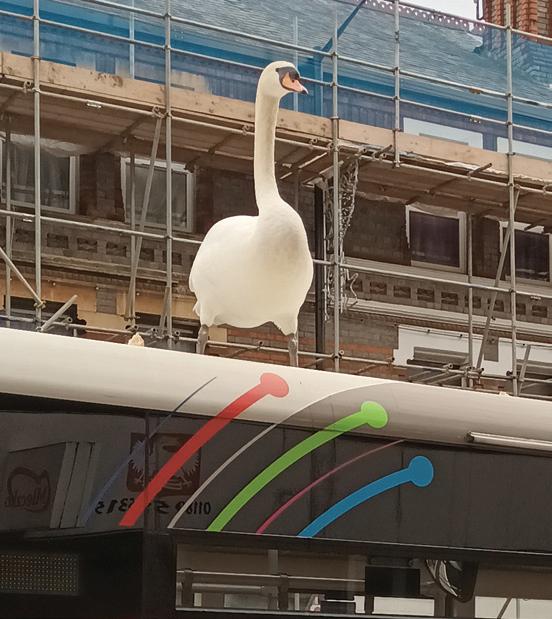
Reading Buses marketing manager Jake Osman thanked the charity for their help. “We hope the swan enjoyed its brief stay,” he added. “It is welcome back on board any time!”
Why not drop us a line at editorial@passengertransport.co.uk